
- Feature Article

Research Culture: Highlighting the positive aspects of being a PhD student
- Elena Angulo
- Elsa Bonnaud
- Loreleï Guéry
- Eléna Manfrini
- Anna Turbelin
- Céline Albert
- Franck Courchamp
- Laboratoire Écologie Systématique Évolution, Université Paris-Saclay, CNRS and AgroParisTech, France ;
- Estación Biológica de Doñana, CSIC, Spain ;
- UMR Plant Health Institute of Montpellier, CIRAD and INRAE, France ;
- Senckenberg Biodiversity and Climate Research Centre, Germany ;
- Smithsonian Conservation Biology Institute, United States ;
- Open access
- Copyright information
- Comment Open annotations (there are currently 0 annotations on this page).
- 46,009 views
- 6,927 downloads
- 7 citations
Share this article
Cite this article.
- Camille Bernery
- Léo Lusardi
- Clara Marino
- Martin Philippe-Lesaffre
- Copy to clipboard
- Download BibTeX
- Download .RIS
- Figures and data
Introduction
Three benefits of doing a phd, recommendations, data availability, article and author information.
Articles about doing a PhD tend to focus on the difficulties faced by research students. Here we argue that the scientific community should also highlight the positive elements of the PhD experience.
Doing a PhD can be both demanding and rewarding. In addition to overcoming the scientific and intellectual challenges involved in doing original research, a PhD student may also have to deal with financial difficulties, an unhealthy work-life balance, or resulting concerns about their mental health ( Woolston, 2017 ; Auerbach et al., 2018 ; Oswalt et al., 2020 ; Evans et al., 2018 ). Despite all this, most PhD students seem satisfied with their decision to do a PhD, mostly because they work in stimulating environments with a high degree of independence and good supervision ( Pommier et al., 2022 ; Woolston, 2017 ).
Paradoxically, however, the fact that most PhD students are positive about doing a PhD is not always apparent to the outside world. For example, the present authors recently analysed more than 90,000 tweets about the PhD experience: almost half of the tweets were positive, and less than a sixth were negative, yet the negative tweets received more likes and retweets ( Figure 1 ). What can be done to counter such misleading and negative impressions? In this article we – a group of PhD students, postdocs and permanent academics – highlight the positive elements of doing a PhD in order to present a more balanced view of the whole PhD experience. We also make recommendations to maintain a positive momentum throughout the PhD. Although these ideas and recommendations are based on our experiences as researchers in ecology working in Europe, we feel that most of the points we make also apply in other disciplines and places.

Sentiment analysis of tweets about the PhD experience.
We retrieved all tweets posted in the English language during 12 consecutive weeks, from September to December 2021, that contained any of the following six hashtags: #phdlife, #phdspeaks, #phdvoice, #phdchat, #phdtips, #phdstudent. We then measured the sentiment (positive, negative or neutral) associated with each original tweet (excluding retweets). Of the 91 229 tweets we retrieved, 43,941 were positive, 12,298 were negative, and 34,990 were neutral. Mann-Whitney U tests were performed to compare the average number of likes and retweets of positive versus negative tweets. Negative tweets received significantly more likes than positive tweets (14.5 vs 12.3; P <0.001); negative tweets were also retweeted more than positive tweets but the difference was not significant (1.7 vs 1.5; P =0.383). The Twitter API and the “rtweet” R package ( cran.r-project.org/web/packages/rtweet/vignettes/intro.html ) were used to retrieve the tweets; the “syuzhet” R package ( rdrr.io/cran/syuzhet/ ) and the Bing lexicon ( Liu, 2012 ) were used for the sentiment analysis; all analyses were performed with R software ( R Development Core Team, 2021 ).
There are two primary outputs from a PhD: new skills and expertise for the graduate, and new knowledge for the wider world. In this article we focus on the former and discuss the three main benefits of doing a PhD for the individual: (i) the development of specific skills to become an expert; (ii) the ability to work in a collaborative environment; (iii) improved communication skills while sharing knowledge ( Figure 2 ). For each of these benefits we discuss both general aspects that apply to most doctoral students, and specific aspects that depend on the student’s supervisor, field of research, location and other factors.

The positive aspects of doing a PhD.
The three primary benefits of doing a PhD are acquiring expertise (pink circle), learning to work in a collaborative environment (blue), and developing communication skills for sharing knowledge (yellow). For each benefit, general aspects that apply to almost all doctoral students are shown in bold type in the small circle, and specific aspects that depend on, for example, the student’s supervisor or field of research are shown in plain type in the large circle. The large grey area contains more abstract and subjective ideas that are not discussed in the main text. It should be noted that this figure is conceptual, and that the aspects and ideas in it could be grouped in other, equally valid, ways.
Becoming an expert
Throughout a doctoral project, a PhD student will develop many of the skills needed to grow into an independent researcher, while also developing expertise in a given field. In addition to learning a great deal about their own field – and adding knowledge to it – a PhD student will learn how to perform a variety of tasks, and thus acquire new transferable skills. These will include autonomy, critical thinking, organization and planning, resilience, and the ability to design, lead and carry out projects. Furthermore, unlike postdocs and principal investigators, who have to carry out various management and administrative tasks, PhD students are usually free to dedicate their working hours almost exclusively to academic pursuits that they are (or can become) passionate about. This freedom is one of the aspects that make the PhD experience unique, and it should not be overlooked or taken for granted. Unfortunately, not all PhD students benefit from or are aware of such autonomy, but this ought to be an objective for all PhDs.
A PhD does not consist of a number of uneventful years that culminate in a single success. Rather, there are many steps along the way – such as mastering a technique, completing a series of experiments or activities in the field, or finishing the first draft of a manuscript – and the feeling of accomplishment that comes with each completed milestone should be a source of pride to the student.
Working in a collaborative environment
Learning how to work with other researchers is an important part of getting a PhD. The PhD student’s most important working relationship is with their supervisor (or, in some cases, supervisors), but most PhD students will also have the opportunity to collaborate with other members of their research group or lab, or even with researchers from the wider community. Working on other projects from time to time can help the student’s own project through increased productivity and creativity; moreover, it can strengthen lab cohesion, and might even lead to the student being a co-author on a paper. Additionally, supervising undergraduate students – or even new graduate students – is a good way of acquiring management skills.
Conferences are another way to meet and interact with other researchers. In particular, they are an opportunity to discover, discuss and be inspired by the work of other scientists. Conversations at conferences can generate new research questions or ideas for new and improved ways to tackle existing questions. Moreover, presenting results at a conference gives students a chance to receive feedback, to be recognized as active researchers by their peers, and to build a professional network.
Collaboration also can happen through the many virtual communities that PhD students can join for technical, scientific or moral support. For example, the Global PhD Server enables doctoral students to discuss their experience, exchange anecdotes, and offer or seek help. The @PhDForum supports a variety of activities, such as writing sessions for PhD students working on papers or chapters of their thesis, while Stack Overflow is a good place to offer/seek help with coding and statistics.
Developing communication skills
The ability to communicate results is a crucial skill for any researcher. A PhD student will, for example, be required to present their work to other scientists as talks or posters at meetings and conferences. The student will also start learning how to write a scientific article. Moreover, there are many opportunities for PhD students to share their passion and knowledge about their field, such as teaching and mentoring undergraduates and other graduate students. They can also get involved in public outreach, and contribute to awakening new passions or educating citizens on certain topics.
Along the PhD journey, neither the doctoral student nor the supervisor will have full control over what will happen. Some things will go wrong, which is why it is important to remain positive and try to make the most of what is a unique opportunity. Ways for the student to remain positive include going back to old pages in their laboratory notebook to see how much progress has been made, and keeping a note of all the positive feedback from different people. It is also important to remember that one does not become a PhD student by chance – being accepted to do a PhD is an achievement in itself. Additionally, sharing preliminary results with other members of the group and attending social events of a lab can build a supportive working atmosphere and help students to stay positive.
Focusing only on research can sometimes be exhausting, so spending time on other activities – such as supervising students, teaching, or working on outreach – can break the monotony and generate a sense of progress. Finally, it is important to celebrate achievements, such as a first draft, an accepted paper, a conference presentation or the submission of a grant proposal (and, obviously, a successful grant proposal). These achievements can be celebrated in the real world, on social media – or both! By regularly highlighting positive outcomes, it is easier to recognise that past difficulties have been overcome, that progress has been made, and that expertise, skills and knowledge have been gained.
In parallel, it is important to try to limit the impact of the negative aspects of the PhD experience, for they are real and various, and can be crushing if left unchecked. First, it is essential to contextualize them. For example, bear in mind that failure is an integral part of progress, and is often just a temporary setback as opposed to a defeat. This is especially true when a manuscript is rejected by a journal: viewing the rejection as an opportunity to improve the manuscript, and acknowledging that the reviewer reports are about the science, not the authors, can help reframe rejections in a positive light. After all, even the most distinguished researchers have experienced rejection many times. Moreover, as highlighted above, science is a collective adventure, and one is rarely alone when help is sought out. In this regard, talking about the challenges one encounters during a PhD with other students or researchers can also help put these challenges into perspective and to see the positive aspects.
The relationship between the PhD student and their supervisor will likely have a big influence on the PhD experience. However, it is important to recognize that this relationship works both ways, and both stand to benefit if it works well. Among other things, the PhD students can help their own cause by being clear on the type of feedback they want, or by scheduling regular meetings focused on their PhD – and persisting even if their supervisor is busy ( Kearns and Gardiner, 2011 ).
We would also encourage supervisors to be positive in their interactions with their PhD students, and to build a global productive environment that could benefit the PhD student ( Andreev et al., 2022 ). Supervisors could, for example, praise PhD students when the opportunity arises, and ensure that criticism is always constructive – and also encourage other members of their lab to do the same.
PhD students may also face challenges that cannot be overcome with positive thinking. Abusive behaviours such as bullying, harassment or discrimination should be reported to the relevant authorities immediately.
Some PhD students will also be anxious about their future job prospects, especially if they hope to remain in academic research. One way to help reduce such anxiety is to clarify life/career goals and identify the steps needed to reach them. For example, if the student makes a list of all potential funding opportunities (including deadlines) at the start of their last year, it will help them plan for the future and relieve some of the pressure that will build up towards the end of their PhD. Building a professional network can also help with career planning, and attending conferences and establishing collaborations are crucial in this regard.
Finally, if needed, it is entirely acceptable for a PhD student to take a break during their PhD, to refocus on what they really want in life, or to even leave their PhD without finishing it if they realize that it is not for them. However, before making such a decision, we would encourage the student to ask themselves if the doubts they are experiencing are due to a momentary difficulty that will pass, or if a PhD is not really the right career path for them.
Doing a PhD is a unique experience that typically occupies three or more years of someone’s life. Through this experience the student will be enriched by acquiring a range of professional and personal skills, and by gaining a prestigious qualification. In the end, it is in the interest of everyone – the PhD student, the supervisor, their colleagues, their institutions, and academia in general – to make this experience as positive as possible.
All data generated or analysed during this study came from Twitter API and cannot be shared.
- Google Scholar
- Auerbach RP
- Bruffaerts R
- Demyttenaere K
- Pinder-Amaker S
- Zaslavsky AM
- WHO WMH-ICS Collaborators
- Gastelum JB
- Vanderford NL
- Chestnut-Steich K
- Halbritter A
- Auffray-Seguette M
- Elshawish P
- R Development Core Team
Author details
Camille Bernery is in the Laboratoire Écologie Systématique Évolution, Université Paris-Saclay, CNRS and AgroParisTech, Orsay, France
Contribution
Contributed equally with, for correspondence, competing interests.
Léo Lusardi is in the Laboratoire Écologie Systématique Évolution, Université Paris-Saclay, CNRS and AgroParisTech, Orsay, France
Clara Marino is in the Laboratoire Écologie Systématique Évolution, Université Paris-Saclay, CNRS and AgroParisTech, Orsay, France
Martin Philippe-Lesaffre is in the Laboratoire Écologie Systématique Évolution, Université Paris-Saclay, CNRS and AgroParisTech, Orsay, France
Elena Angulo is in the Estación Biológica de Doñana, CSIC, Sevilla, Spain and the Laboratoire Écologie Systématique Évolution, Université Paris-Saclay, CNRS and AgroParisTech, Orsay, France
Elsa Bonnaud is in the Laboratoire Écologie Systématique Évolution, Université Paris-Saclay, CNRS and AgroParisTech, Orsay, France
Loreleï Guéry is in the UMR Plant Health Institute of Montpellier, CIRAD and INRAE, Montpellier, France
Eléna Manfrini is in the Laboratoire Écologie Systématique Évolution, Université Paris-Saclay, CNRS and AgroParisTech, Orsay, France
Anna Turbelin is in the Laboratoire Écologie Systématique Évolution, Université Paris-Saclay, CNRS and AgroParisTech, Orsay, France
Céline Albert is in the Laboratoire Écologie Systématique Évolution, Université Paris-Saclay, CNRS and AgroParisTech, Orsay, France
Ugo Arbieu is in the Laboratoire Écologie Systématique Évolution, Université Paris-Saclay, CNRS and AgroParisTech, Orsay, France, the Senckenberg Biodiversity and Climate Research Centre, Frankfurt am Main, Germany, and the Smithsonian Conservation Biology Institute, Front Royal, United States
Franck Courchamp is in the Laboratoire Écologie Systématique Évolution, Université Paris-Saclay, CNRS and AgroParisTech, Orsay, France
Acknowledgements
The authors thank the internal reviewers (Céline Bellard, Eva Delmas, Christophe Diagne and Xavier Fauvergue) for useful recommendations. Work on this paper began during a lab retreat attended by all co-authors. PhD students were funded by the French Ministry of Higher Education (CB, LL, CM, MPL); postdocs were funded by the Senckenberg Biodiversity and Climate Research Centre (UA), the Biodiversa ERA-Net AlienScenario project (AT), and the AXA Research Fund Chair for Invasion Biology of University Paris-Saclay (EA, CA, EM); Tenured academics salary were funded by the University Paris-Saclay (EB), the CIRAD (LG) and the CNRS (FC). MPL was also funded as an intern by the ENS Paris-Saclay during part of the project.
Publication history
- Received: June 15, 2022
- Accepted: July 13, 2022
- Version of Record published: July 26, 2022 (version 1)
© 2022, Bernery, Lusardi, Marino et al.
This article is distributed under the terms of the Creative Commons Attribution License , which permits unrestricted use and redistribution provided that the original author and source are credited.
Views, downloads and citations are aggregated across all versions of this paper published by eLife.
Download links
Downloads (link to download the article as pdf).
- Article PDF
Open citations (links to open the citations from this article in various online reference manager services)
Cite this article (links to download the citations from this article in formats compatible with various reference manager tools), categories and tags.
- research culture
- graduate school
- early-career researchers
- Part of Collection

Research Culture: A Selection of Articles
Further reading.
Research culture needs to be improved for the benefit of science and scientists.
- Epidemiology and Global Health
Landscape drives zoonotic malaria prevalence in non-human primates
Zoonotic disease dynamics in wildlife hosts are rarely quantified at macroecological scales due to the lack of systematic surveys. Non-human primates (NHPs) host Plasmodium knowlesi, a zoonotic malaria of public health concern and the main barrier to malaria elimination in Southeast Asia. Understanding of regional P. knowlesi infection dynamics in wildlife is limited. Here, we systematically assemble reports of NHP P. knowlesi and investigate geographic determinants of prevalence in reservoir species. Meta-analysis of 6322 NHPs from 148 sites reveals that prevalence is heterogeneous across Southeast Asia, with low overall prevalence and high estimates for Malaysian Borneo. We find that regions exhibiting higher prevalence in NHPs overlap with human infection hotspots. In wildlife and humans, parasite transmission is linked to land conversion and fragmentation. By assembling remote sensing data and fitting statistical models to prevalence at multiple spatial scales, we identify novel relationships between P. knowlesi in NHPs and forest fragmentation. This suggests that higher prevalence may be contingent on habitat complexity, which would begin to explain observed geographic variation in parasite burden. These findings address critical gaps in understanding regional P. knowlesi epidemiology and indicate that prevalence in simian reservoirs may be a key spatial driver of human spillover risk.
- Computational and Systems Biology
Collaborative hunting in artificial agents with deep reinforcement learning
Collaborative hunting, in which predators play different and complementary roles to capture prey, has been traditionally believed to be an advanced hunting strategy requiring large brains that involve high-level cognition. However, recent findings that collaborative hunting has also been documented in smaller-brained vertebrates have placed this previous belief under strain. Here, using computational multi-agent simulations based on deep reinforcement learning, we demonstrate that decisions underlying collaborative hunts do not necessarily rely on sophisticated cognitive processes. We found that apparently elaborate coordination can be achieved through a relatively simple decision process of mapping between states and actions related to distance-dependent internal representations formed by prior experience. Furthermore, we confirmed that this decision rule of predators is robust against unknown prey controlled by humans. Our computational ecological results emphasize that collaborative hunting can emerge in various intra- and inter-specific interactions in nature, and provide insights into the evolution of sociality.
Be the first to read new articles from eLife

About Stanford GSB
- The Leadership
- Dean’s Updates
- School News & History
- Commencement
- Business, Government & Society
- Centers & Institutes
- Center for Entrepreneurial Studies
- Center for Social Innovation
- Stanford Seed
About the Experience
- Learning at Stanford GSB
- Experiential Learning
- Guest Speakers
- Entrepreneurship
- Social Innovation
- Communication
- Life at Stanford GSB
- Collaborative Environment
- Activities & Organizations
- Student Services
- Housing Options
- International Students
Full-Time Degree Programs
- Why Stanford MBA
- Academic Experience
- Financial Aid
- Why Stanford MSx
- Research Fellows Program
- See All Programs
Non-Degree & Certificate Programs
- Executive Education
- Stanford Executive Program
- Programs for Organizations
- The Difference
- Online Programs
- Stanford LEAD
- Seed Transformation Program
- Aspire Program
- Seed Spark Program
- Faculty Profiles
- Academic Areas
- Awards & Honors
- Conferences
Faculty Research
- Publications
- Working Papers
- Case Studies
Research Hub
- Research Labs & Initiatives
- Business Library
- Data, Analytics & Research Computing
- Behavioral Lab
Research Labs
- Cities, Housing & Society Lab
- Golub Capital Social Impact Lab
Research Initiatives
- Corporate Governance Research Initiative
- Corporations and Society Initiative
- Policy and Innovation Initiative
- Rapid Decarbonization Initiative
- Stanford Latino Entrepreneurship Initiative
- Value Chain Innovation Initiative
- Venture Capital Initiative
- Career & Success
- Climate & Sustainability
- Corporate Governance
- Culture & Society
- Finance & Investing
- Government & Politics
- Leadership & Management
- Markets & Trade
- Operations & Logistics
- Opportunity & Access
- Organizational Behavior
- Political Economy
- Social Impact
- Technology & AI
- Opinion & Analysis
- Email Newsletter
Welcome, Alumni
- Communities
- Digital Communities & Tools
- Regional Chapters
- Women’s Programs
- Identity Chapters
- Find Your Reunion
- Career Resources
- Job Search Resources
- Career & Life Transitions
- Programs & Services
- Career Video Library
- Alumni Education
- Research Resources
- Volunteering
- Alumni News
- Class Notes
- Alumni Voices
- Contact Alumni Relations
- Upcoming Events
Admission Events & Information Sessions
- MBA Program
- MSx Program
- PhD Program
- Alumni Events
- All Other Events
- Requirements
- Requirements: Behavioral
- Requirements: Quantitative
- Requirements: Macro
- Requirements: Micro
- Annual Evaluations
- Field Examination
- Research Activities
- Research Papers
- Dissertation
- Oral Examination
- Current Students
- Entering Class Profile
- Education & CV
- GMAT & GRE
- International Applicants
- Statement of Purpose
- Letters of Recommendation
- Reapplicants
- Application Fee Waiver
- Deadline & Decisions
- Job Market Candidates
- Academic Placements
- Stay in Touch
- Fields of Study
- Student Life
Academic Experience in the PhD Program
The PhD program’s distinct academic approach is designed to enable students to excel as researchers, educators, and scholars in the future.
Throughout their five-year experience, students focus on one of seven distinct areas of study . Students work closely with PhD faculty and the other students within their field of study, among other scholars and peers across the university. Small class sizes and an intimate faculty-to-student ratio ensures that all students benefit from the attention and expertise of respected experts in their fields.
The intensity of the full-time PhD program demands energy and zeal in the pursuit of greater understanding, and a commitment to master the behavioral, economic, and mathematical sciences that are the essential components of academic research in business-related disciplines. The curriculum is designed to equip students with the tools to pursue the most challenging research agendas. Residence is required for the majority of the program’s duration.
While disciplined and rigorous in training, the program is also flexible for students to pursue their unique research interests. Students customize their program within their chosen discipline to their own goals and research interests.
Collaborative
The collaborative culture of Stanford GSB thrives in the PhD program. Students learn, study, and work together. It’s a dynamic that leads to deep relationships, shared accomplishments, and an enduring support network.
Recent Journal Articles
Financial inclusion, economic development, and inequality: evidence from brazil, when the one true faith trumps all: low religious diversity, religious intolerance, and science denial, diversity washing, large language models for preventing medication direction errors in online pharmacies, mediated collusion, stanford university.
- Priorities for the GSB's Future
- See the Current DEI Report
- Supporting Data
- Research & Insights
- Share Your Thoughts
- Search Fund Primer
- Teaching & Curriculum
- Affiliated Faculty
- Faculty Advisors
- Louis W. Foster Resource Center
- Defining Social Innovation
- Impact Compass
- Global Health Innovation Insights
- Faculty Affiliates
- Student Awards & Certificates
- Changemakers
- Dean Jonathan Levin
- Dean Garth Saloner
- Dean Robert Joss
- Dean Michael Spence
- Dean Robert Jaedicke
- Dean Rene McPherson
- Dean Arjay Miller
- Dean Ernest Arbuckle
- Dean Jacob Hugh Jackson
- Dean Willard Hotchkiss
- Faculty in Memoriam
- Stanford GSB Firsts
- Certificate & Award Recipients
- Teaching Approach
- Analysis and Measurement of Impact
- The Corporate Entrepreneur: Startup in a Grown-Up Enterprise
- Data-Driven Impact
- Designing Experiments for Impact
- Digital Business Transformation
- The Founder’s Right Hand
- Marketing for Measurable Change
- Product Management
- Public Policy Lab: Financial Challenges Facing US Cities
- Public Policy Lab: Homelessness in California
- Lab Features
- Curricular Integration
- View From The Top
- Formation of New Ventures
- Managing Growing Enterprises
- Startup Garage
- Explore Beyond the Classroom
- Stanford Venture Studio
- Summer Program
- Workshops & Events
- The Five Lenses of Entrepreneurship
- Leadership Labs
- Executive Challenge
- Arbuckle Leadership Fellows Program
- Selection Process
- Training Schedule
- Time Commitment
- Learning Expectations
- Post-Training Opportunities
- Who Should Apply
- Introductory T-Groups
- Leadership for Society Program
- Certificate
- 2023 Awardees
- 2022 Awardees
- 2021 Awardees
- 2020 Awardees
- 2019 Awardees
- 2018 Awardees
- Social Management Immersion Fund
- Stanford Impact Founder Fellowships and Prizes
- Stanford Impact Leader Prizes
- Social Entrepreneurship
- Stanford GSB Impact Fund
- Economic Development
- Energy & Environment
- Stanford GSB Residences
- Environmental Leadership
- Stanford GSB Artwork
- A Closer Look
- California & the Bay Area
- Voices of Stanford GSB
- Business & Beneficial Technology
- Business & Sustainability
- Business & Free Markets
- Business, Government, and Society Forum
- Get Involved
- Second Year
- Global Experiences
- JD/MBA Joint Degree
- MA Education/MBA Joint Degree
- MD/MBA Dual Degree
- MPP/MBA Joint Degree
- MS Computer Science/MBA Joint Degree
- MS Electrical Engineering/MBA Joint Degree
- MS Environment and Resources (E-IPER)/MBA Joint Degree
- Academic Calendar
- Clubs & Activities
- LGBTQ+ Students
- Military Veterans
- Minorities & People of Color
- Partners & Families
- Students with Disabilities
- Student Support
- Residential Life
- Student Voices
- MBA Alumni Voices
- A Week in the Life
- Career Support
- Employment Outcomes
- Cost of Attendance
- Knight-Hennessy Scholars Program
- Yellow Ribbon Program
- BOLD Fellows Fund
- Application Process
- Loan Forgiveness
- Contact the Financial Aid Office
- Evaluation Criteria
- English Language Proficiency
- Personal Information, Activities & Awards
- Professional Experience
- Optional Short Answer Questions
- Application Fee
- Reapplication
- Deferred Enrollment
- Joint & Dual Degrees
- Event Schedule
- Ambassadors
- New & Noteworthy
- Ask a Question
- See Why Stanford MSx
- Is MSx Right for You?
- MSx Stories
- Leadership Development
- Career Advancement
- Career Change
- How You Will Learn
- Admission Events
- Personal Information
- Information for Recommenders
- GMAT, GRE & EA
- English Proficiency Tests
- After You’re Admitted
- Daycare, Schools & Camps
- U.S. Citizens and Permanent Residents
- Faculty Mentors
- Current Fellows
- Standard Track
- Fellowship & Benefits
- Group Enrollment
- Program Formats
- Developing a Program
- Diversity & Inclusion
- Strategic Transformation
- Program Experience
- Contact Client Services
- Campus Experience
- Live Online Experience
- Silicon Valley & Bay Area
- Digital Credentials
- Faculty Spotlights
- Participant Spotlights
- Eligibility
- International Participants
- Stanford Ignite
- Frequently Asked Questions
- Operations, Information & Technology
- Classical Liberalism
- The Eddie Lunch
- Accounting Summer Camp
- Videos, Code & Data
- California Econometrics Conference
- California Quantitative Marketing PhD Conference
- California School Conference
- China India Insights Conference
- Homo economicus, Evolving
- Political Economics (2023–24)
- Scaling Geologic Storage of CO2 (2023–24)
- A Resilient Pacific: Building Connections, Envisioning Solutions
- Adaptation and Innovation
- Changing Climate
- Civil Society
- Climate Impact Summit
- Climate Science
- Corporate Carbon Disclosures
- Earth’s Seafloor
- Environmental Justice
- Operations and Information Technology
- Organizations
- Sustainability Reporting and Control
- Taking the Pulse of the Planet
- Urban Infrastructure
- Watershed Restoration
- Junior Faculty Workshop on Financial Regulation and Banking
- Ken Singleton Celebration
- Marketing Camp
- Quantitative Marketing PhD Alumni Conference
- Presentations
- Theory and Inference in Accounting Research
- Stanford Closer Look Series
- Quick Guides
- Core Concepts
- Journal Articles
- Glossary of Terms
- Faculty & Staff
- Researchers & Students
- Research Approach
- Charitable Giving
- Financial Health
- Government Services
- Workers & Careers
- Short Course
- Adaptive & Iterative Experimentation
- Incentive Design
- Social Sciences & Behavioral Nudges
- Bandit Experiment Application
- Conferences & Events
- Reading Materials
- Energy Entrepreneurship
- Faculty & Affiliates
- SOLE Report
- Responsible Supply Chains
- Current Study Usage
- Pre-Registration Information
- Participate in a Study
- Founding Donors
- Location Information
- Participant Profile
- Network Membership
- Program Impact
- Collaborators
- Entrepreneur Profiles
- Company Spotlights
- Seed Transformation Network
- Responsibilities
- Current Coaches
- How to Apply
- Meet the Consultants
- Meet the Interns
- Intern Profiles
- Collaborate
- Research Library
- News & Insights
- Program Contacts
- Databases & Datasets
- Research Guides
- Consultations
- Research Workshops
- Career Research
- Research Data Services
- Course Reserves
- Course Research Guides
- Material Loan Periods
- Fines & Other Charges
- Document Delivery
- Interlibrary Loan
- Equipment Checkout
- Print & Scan
- MBA & MSx Students
- PhD Students
- Other Stanford Students
- Faculty Assistants
- Research Assistants
- Stanford GSB Alumni
- Telling Our Story
- Staff Directory
- Site Registration
- Alumni Directory
- Alumni Email
- Privacy Settings & My Profile
- Success Stories
- The Story of Circles
- Support Women’s Circles
- Stanford Women on Boards Initiative
- Alumnae Spotlights
- Insights & Research
- Industry & Professional
- Entrepreneurial Commitment Group
- Recent Alumni
- Half-Century Club
- Fall Reunions
- Spring Reunions
- MBA 25th Reunion
- Half-Century Club Reunion
- Faculty Lectures
- Ernest C. Arbuckle Award
- Alison Elliott Exceptional Achievement Award
- ENCORE Award
- Excellence in Leadership Award
- John W. Gardner Volunteer Leadership Award
- Robert K. Jaedicke Faculty Award
- Jack McDonald Military Service Appreciation Award
- Jerry I. Porras Latino Leadership Award
- Tapestry Award
- Student & Alumni Events
- Executive Recruiters
- Interviewing
- Land the Perfect Job with LinkedIn
- Negotiating
- Elevator Pitch
- Email Best Practices
- Resumes & Cover Letters
- Self-Assessment
- Whitney Birdwell Ball
- Margaret Brooks
- Bryn Panee Burkhart
- Margaret Chan
- Ricki Frankel
- Peter Gandolfo
- Cindy W. Greig
- Natalie Guillen
- Carly Janson
- Sloan Klein
- Sherri Appel Lassila
- Stuart Meyer
- Tanisha Parrish
- Virginia Roberson
- Philippe Taieb
- Michael Takagawa
- Terra Winston
- Johanna Wise
- Debbie Wolter
- Rebecca Zucker
- Complimentary Coaching
- Changing Careers
- Work-Life Integration
- Career Breaks
- Flexible Work
- Encore Careers
- Join a Board
- D&B Hoovers
- Data Axle (ReferenceUSA)
- EBSCO Business Source
- Global Newsstream
- Market Share Reporter
- ProQuest One Business
- Student Clubs
- Entrepreneurial Students
- Stanford GSB Trust
- Alumni Community
- How to Volunteer
- Springboard Sessions
- Consulting Projects
- 2020 – 2029
- 2010 – 2019
- 2000 – 2009
- 1990 – 1999
- 1980 – 1989
- 1970 – 1979
- 1960 – 1969
- 1950 – 1959
- 1940 – 1949
- Service Areas
- ACT History
- ACT Awards Celebration
- ACT Governance Structure
- Building Leadership for ACT
- Individual Leadership Positions
- Leadership Role Overview
- Purpose of the ACT Management Board
- Contact ACT
- Business & Nonprofit Communities
- Reunion Volunteers
- Ways to Give
- Fiscal Year Report
- Business School Fund Leadership Council
- Planned Giving Options
- Planned Giving Benefits
- Planned Gifts and Reunions
- Legacy Partners
- Giving News & Stories
- Giving Deadlines
- Development Staff
- Submit Class Notes
- Class Secretaries
- Board of Directors
- Health Care
- Sustainability
- Class Takeaways
- All Else Equal: Making Better Decisions
- If/Then: Business, Leadership, Society
- Grit & Growth
- Think Fast, Talk Smart
- Spring 2022
- Spring 2021
- Autumn 2020
- Summer 2020
- Winter 2020
- In the Media
- For Journalists
- DCI Fellows
- Other Auditors
- Academic Calendar & Deadlines
- Course Materials
- Entrepreneurial Resources
- Campus Drive Grove
- Campus Drive Lawn
- CEMEX Auditorium
- King Community Court
- Seawell Family Boardroom
- Stanford GSB Bowl
- Stanford Investors Common
- Town Square
- Vidalakis Courtyard
- Vidalakis Dining Hall
- Catering Services
- Policies & Guidelines
- Reservations
- Contact Faculty Recruiting
- Lecturer Positions
- Postdoctoral Positions
- Accommodations
- CMC-Managed Interviews
- Recruiter-Managed Interviews
- Virtual Interviews
- Campus & Virtual
- Search for Candidates
- Think Globally
- Recruiting Calendar
- Recruiting Policies
- Full-Time Employment
- Summer Employment
- Entrepreneurial Summer Program
- Global Management Immersion Experience
- Social-Purpose Summer Internships
- Process Overview
- Project Types
- Client Eligibility Criteria
- Client Screening
- ACT Leadership
- Social Innovation & Nonprofit Management Resources
- Develop Your Organization’s Talent
- Centers & Initiatives
- Student Fellowships
Suggestions or feedback?
MIT News | Massachusetts Institute of Technology
- Machine learning
- Social justice
- Black holes
- Classes and programs
Departments
- Aeronautics and Astronautics
- Brain and Cognitive Sciences
- Architecture
- Political Science
- Mechanical Engineering
Centers, Labs, & Programs
- Abdul Latif Jameel Poverty Action Lab (J-PAL)
- Picower Institute for Learning and Memory
- Lincoln Laboratory
- School of Architecture + Planning
- School of Engineering
- School of Humanities, Arts, and Social Sciences
- Sloan School of Management
- School of Science
- MIT Schwarzman College of Computing
The challenges and triumphs of the graduate experience
Press contact :.
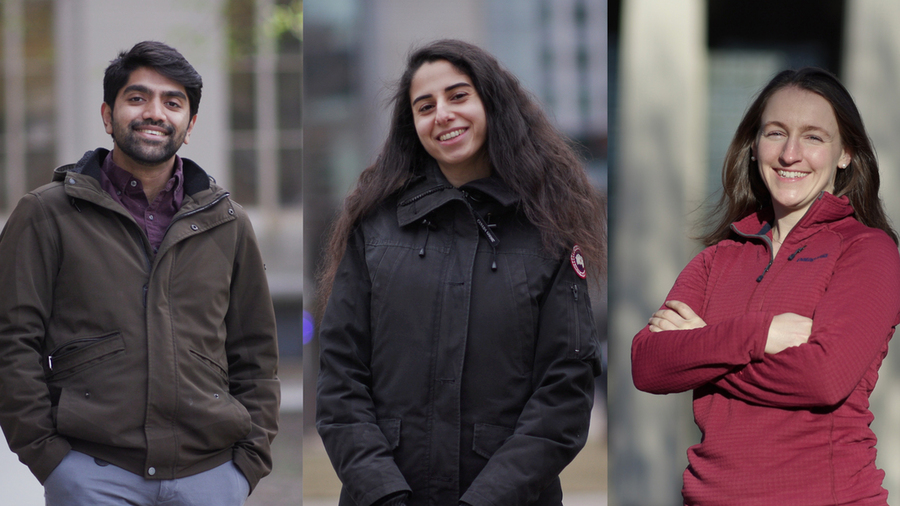
Previous image Next image
For many graduate students, the first time they enter MIT’s campus as a student is a momentous occasion. Standing among the pillars and domes for the first time as an MIT student elicited a moment of quiet reflection for recent graduate Hilary Johnson SM ’18, PhD ’22.
“It was this moment of awe and kind of reverence for the temple of learning that the architecture suggests,” Johnson says. “I paused in silence for a moment to absorb the aura of reverence for the task that we’re each pursuing: the discovery of new scientific knowledge and the invention of things that ultimately help improve the world in which we live.”
Vishnu Jayaprakash SM ’19, PhD ’22 had a similar experience.
“You grow up wanting to be on the inside of those pillars, so the first time I walked into Building 7 I just took it all in. It was sort of the end of a lifelong journey to get until that point, but at the same time it was the start of a new one,” adds Jayaprakash.
That journey is one that can be incredibly challenging, both academically and personally, for doctoral students.

“Graduate school is a time of intense intellectual and personal growth, where our students gain all kinds of skill sets, new experiences, and academic and professional strengths at the very time they’re forming the foundations for their adult lives,” says Betar Gallant ’08, SM ’10, PhD ’13, associate professor of mechanical engineering. “It’s by definition a transitory time, which can feel unsettling.”
The mechanical engineering faculty and staff at MIT aim to help students through this transition by offering support and encouragement as they tackle challenges and grow as researchers. As faculty ambassador to graduate students, Gallant fosters dialogue between students and the broader faculty and emphasizes the need for empathy in both directions.
Students also have the support of the MIT Department of Mechanical Engineering’s Graduate Office to help them tackle challenges.
“The graduate student experience is unique and multifaceted for each student. At the MechE Graduate Office, our team approaches each student holistically trying to pave the way so that there are less bumps along the way,” says Saana McDaniel, academic administrator for the mechanical engineering graduate program. McDaniel and her team help solve problems to ensure each student can achieve their full potential.
While some challenges are inherent in completing advanced studies and contributing a significant piece of original research, there are other challenges graduate students face that can and should be addressed.
Over the past few years, the mechanical engineering department leadership have committed considerable time and resources to learning about the problems graduate students face and developing initiatives to improve their experience.
“An important first step is understanding the challenges faced by our graduate students,” says Evelyn Wang, Ford Professor of Engineering and mechanical engineering department head.
During Visit Weekend, after being admitted to the advanced degree program, graduate students face the first big challenge of graduate school: finding an advisor.
Navigating the advising relationship
“I think it’s one of the hardest processes at MIT that no one really talks about,” says Jayaprakash. “During Visit Weekend, everyone stresses how important it is to find an advisor and to do it quickly.”
Some students liken the process of finding an advisor to speed dating. They connect with a number of faculty members during their Visit Weekend to find one that fits.
For alum Cynthia Hajal SM ’18, PhD ’21, the process was seamless. After a 15-minute meeting with Professor Roger Kamm, she knew instantly that she wanted to work in Kamm’s Mechanobiology Lab.
“The advisor-and-student relationship is very important, maybe even more important than the type of research done in the lab, because the advisor is really the person that's going to vouch for the student during qualifying exams and during committee meetings” says Hajal.
“My meetings with Cynthia, nearly from the beginning, were a wonderful experience in which she would show me what she had done, we could actively exchange ideas, and then come up with a plan,” adds Kamm.
According to Kamm, there is no one-size-fits-all approach to advising. He adjusts the level of supervision needed for doctoral students depending on the individual. He also gives his students freedom to further develop their strengths, and resources to address any weaknesses.
“I listen a lot, and try to avoid telling the student what to do. To develop into a successful researcher, they’ll need to be able to identify problems as they arise, and take the necessary actions to solve them,” says Kamm. “Problem-solving abilities are critical whether entering industry or academia.”
While Hajal was able to easily find an advisor who helped support her growth as a researcher, the advisor-and-advisee relationship can sometimes be a difficult one to navigate.
“Part of the big problem is knowing what the expectations are of you, and what expectations you can reasonably have of your advisor,” adds Jayaprakash. “Everyone wants to see you succeed, and you need to know what that means. You need to know what success is, and I was blessed to have an advisor as caring as Professor Kripa Varanasi, who worked with me to define that.”
Faculty advisors aim to assist students in achieving this success and supporting them through the various challenges they face in their graduate journey. To help advisors better understand these challenges, the department recently launched a revised advising form to be completed each year. This form was designed to foster dialogue about any challenges or obstacles students face, particularly with regards to more effective communication between their advisor and themselves.
“Our students asked for a form that that would help structure better conversations with advisors and build stronger mentorship relationships,” says Gallant. “Students did most of the hard work to propose the updated content, and we worked together to get it voted in by the faculty this spring, which we’re all very enthusiastic about.”
Over the past few years, the department has held workshops and trainings to help improve the advising relationship and address issues related to lab communities, including a pilot workshop called “Building Inclusive Lab Cultures.”
“We have been offering trainings and support for our faculty and graduate students to enhance awareness and empathy. We’ve gotten faculty, staff, and students in lab groups together to recognize different perspectives and different forms of power, as well as to develop intervention strategies,” adds Wang.
The PhD qualifying exam
Another challenge doctoral students face is the PhD qualifying exam — or “quals.” Typically taken at the end of a student's second or third year of graduate school, quals consists of three subject exams and one oral research exam.
“Quals is a rite of passage, and like most rites of passage, it’s challenging and it changes who you are and how you see yourself,” says Johnson.
The months leading up to quals are among the most challenging in a student’s academic career. Students often form study groups, which prove particularly helpful in preparing for the oral component of the exam.
“Looking back at it, quals was the most challenging part of my PhD by far. What allowed me to go through it is having study groups with fellow MechE grad students who were also going through the same thing,” adds Hajal.
For Johnson, quals was a hurdle in her academic career. The first time she took them, she failed the subject exams. A conversation with Amos Winter, associate professor of mechanical engineering, who reminded her that she belonged in MechE, buoyed her spirits. She leaned in to her “growth mindset” as she built on her subject preparation.
Johnson passed her second attempt.
“I came out of quals feeling confident about my ability to justify first-principles thinking, present and share my research, and be interrogated. It was a really challenging and gritty process, but also ultimately very worthwhile,” says Johnson. “After I passed, there was definitely a sense of ‘All right. I'm a badass engineer.’”
Championing diversity, equity, and inclusion (DEI) issues
After the death of George Floyd in 2020, Jayaprakash felt he reached a tipping point.
“When the tragic murder of George Floyd happened, I really questioned our commitment to DEI, and I questioned our commitment to dismantling racial inequalities that exist within the department, but also inequalities that are detrimental to people's success,” recalls Jayaprakash.
Jayaprakash approached leaders in MechE with his frustrations about the inequities and bias he saw within the department.
“The first thing that you would expect is for department leaders to be defensive, but what we saw was an acknowledgement of error and then a commitment to work on that,” he recalls.
Part of that commitment was the launch of the MechE DEI Task Force, a team of students, faculty, and staff led by Associate Professor Asegun Henry that Jayaprakash served on. He and his fellow task force members dedicated thousands of hours into understanding issues related to diversity, equity, and inclusion that exist within the graduate program and the broader department. The mechanical engineering leadership provided resources to support this work, including access to a number of experts and consultants.
“Vishnu was a huge contributor on the task force,” says Henry. “He had awesome ideas to contribute and I learned a lot about how grad students think and feel about many issues today through him.”
According to Henry, including graduate student voices and perspectives in the process was invaluable as the task force developed a strategic plan to suggest possible actions that address various challenges within the department.
“I do know for a fact that MIT MechE cares about these grievances. Having a department chair and faculty who have been in this system and understand the disparities that exist for folks of different backgrounds, that empathy has really been the big difference,” says Jayaprakash.
The plan will propose a number of actions and initiatives that strengthen the department’s commitment to DEI both within the graduate community and the department as a whole.
Training the best in the world
Johnson found herself having another quiet moment of reflection on campus. This time, it was in a hallway in Building 1. She had just defended her PhD thesis on adaptive centrifugal pump geometry for improved efficiency and operating range. Having just presented her research to a room full of faculty, friends, and family, with a Zoom audience of over 70 people watching remotely, all that was left to do was wait as faculty members deliberated behind closed doors.
For a few minutes, Johnson reflected back on her time in MechE and what leaving well means to her. Her advisor, Professor Alexander Slocum, then emerged from the room, shook Johnson’s hand, and announced she had successfully defended her thesis. She was one step closer to becoming a doctor.
“I'm thankful to be here, and for the brilliant people I've gotten to spend these six years with, learn from, and be inspired by — my advisor and professors, my lab mates, my sponsors, my peers, who I see at Friday coffee hour, the folks who I run into in the machine shops. It's been an incredible, wild roller coaster of a ride,” says Johnson. “I certainly know now, after six years, that I am capable of the sort of grit and wit to take on really hard problems.”
Gallant hopes students like Johnson, Hajal, and Jayaprakash continue to run toward the hardest challenges as they join the MIT alumni community.
“Graduate school is challenging, but we are training our students to be the best in the world. I hope our students can find pride in our ethos and culture of tackling the problems that are truly important and which desperately need solving to make this a good planet and society for all,” adds Gallant.
Share this news article on:
Related links.
- Mechanical Engineering Graduate Program
- Department of Mechanical Engineering
Related Topics
- Biological engineering
- Mechanical engineering
- Graduate, postdoctoral
- Diversity and inclusion
Related Articles
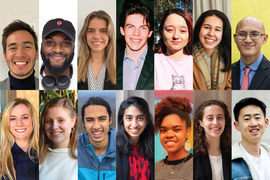
Fourteen from MIT awarded 2022 Fulbright Fellowships
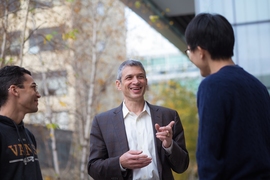
No one-size-fits-all approach for mentorship
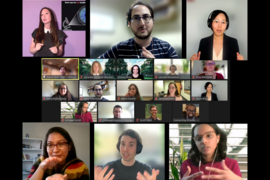
MIT Research Slam showcases postdoc and PhD communication skills
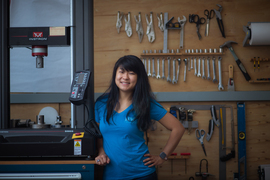
Making her way through MIT
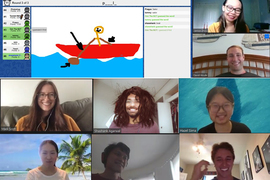
Reorienting graduate student orientation
Previous item Next item
More MIT News

Janabel Xia: Algorithms, dance rhythms, and the drive to succeed
Read full story →
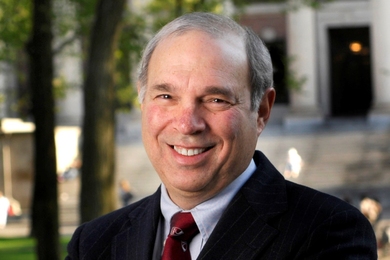
Jonathan Byrnes, MIT Center for Transportation and Logistics senior lecturer and visionary in supply chain management, dies at 75
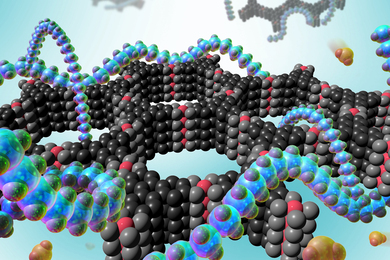
Researchers develop a detector for continuously monitoring toxic gases
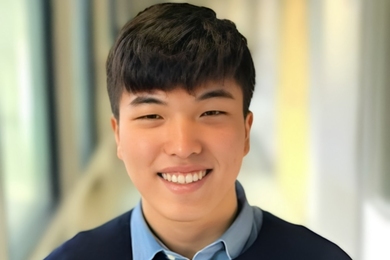
The beauty of biology
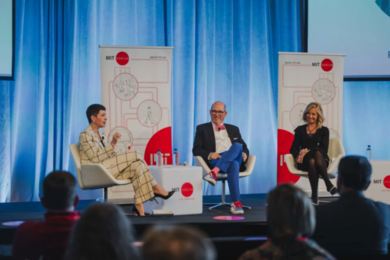
Navigating longevity with industry leaders at MIT AgeLab PLAN Forum
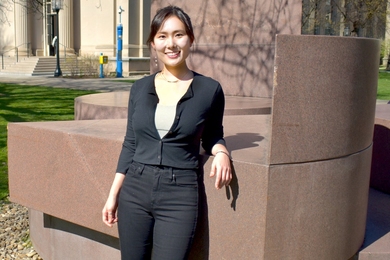
Jeong Min Park earns 2024 Schmidt Science Fellowship
- More news on MIT News homepage →
Massachusetts Institute of Technology 77 Massachusetts Avenue, Cambridge, MA, USA
- Map (opens in new window)
- Events (opens in new window)
- People (opens in new window)
- Careers (opens in new window)
- Accessibility
- Social Media Hub
- MIT on Facebook
- MIT on YouTube
- MIT on Instagram

The PhD student experience – What is it really like for PhDs?
Are you curious about what it’s really like to be a PhD student, navigating the world of academia and research?
In this article, we’ll dive deep into the lesser-known aspects of the PhD journey, from the profound impact of your supervisor to the competitive environment you’ll face.
Discover the truth about the importance of publishing papers and the realities of funding and job security in academia.
We’ll also give you a glimpse into the daily life of a PhD student, and explore the highs and lows of this challenging yet rewarding experience.
So, buckle up and join us as we uncover the secrets of the PhD student experience that no one else will tell you!
The little known-facts that you need to know about the PhD experience,
This is what no one else will tell you!
What does the daily life of a PhD student look like?
Embarking on a PhD journey can be a thrilling yet demanding experience, as a doctoral student is constantly immersed in:
- academic responsibilities,
- and professional development.
From the early morning, the life of a PhD student begins with checking emails, planning the day, and setting priorities.
A typical day usually involves conducting experiments or research in the laboratory, analyzing data, and reading scientific literature to stay up-to-date with their field.
PhD students often participate in regular meetings with their supervisors, who provide guidance and advice on their research projects.
These meetings are crucial for maintaining momentum and ensuring a productive working relationship.
A typical daily schedule for a PhD student might look like this:
7:00 AM – Wake up, morning routine, breakfast
7:45 AM – Check emails, plan the day, and set priorities
8:30 AM – Arrive at the laboratory, set up experiments or research tasks
9:30 AM – Attend a class or seminar (if applicable)
11:00 AM – Conduct experiments or research in the laboratory
12:30 PM – Lunch break, socialize with fellow graduate students
1:30 PM – Analyze data and read scientific literature relevant to the research project
3:00 PM – Meeting with supervisor to discuss research progress and receive guidance
4:30 PM – Continue working on experiments, data analysis, or literature review
6:00 PM – Dinner break
8:00 PM – Draft or edit thesis, work on conference presentations or publications
10:00 PM – Wind down and engage in a hobby or leisure activity for mental health and work-life balance
11:00 PM – Bedtime routine, sleep
In addition to their primary research, many PhD students assist and mentor undergraduate students, contributing to a diverse and dynamic academic community.
Balancing the demands of coursework, research projects, and administrative responsibilities can make for long working hours, which is why it’s important for doctoral students to maintain their mental health and work-life balance.
Attending conferences, participating in social events, and engaging in professional development opportunities are important aspects of the PhD experience.
Given the commitment and dedication required, full-time PhD students often rely on funded positions to support their education and living expenses.
Despite the inherent difficulties, the experience equips students with a range of new skills and expertise, setting them on a path to contribute significantly to academia and the world beyond.
How stressful is being a PhD student?
Being a PhD student can be quite stressful due to the unique challenges and demands of the program.
It varies from person to person and the supervisor will have a huge impact on how stressful a PhD will be for a student.
Here is a case study of the highs and lows of a PhD from a PhDs student’s perspective:
This PhD student experienced frustration with experiments not working or yielding results, leading to feelings of imposter syndrome and demotivation. A lack of progress was a significant source of stress during this time, as well as comparing oneself to peers who seemed to be achieving more success.
However, there were also numerous highlights throughout the PhD experience. Attending conferences and presenting research offered opportunities to gain feedback, collaborate with others, and even travel. Engaging in scientific discussions and exploring the significance of one’s work provided a sense of purpose and satisfaction.
Furthermore, working with cutting-edge equipment, such as advanced microscopes, allowed the student to appreciate the unique and privileged nature of their research.
The pressure to produce significant contributions to one’s field and the uncertainty of achieving results within a limited time frame can induce anxiety.
For instance, many students find themselves constantly juggling various responsibilities, such as conducting experiments, analysing data, attending meetings with their supervisor, and writing their thesis or papers.
Aside from academic pressure, managing work-life balance can be difficult as well. It’s not uncommon for PhD students to work long hours, often sacrificing personal time and relationships.
The lack of a structured schedule and the need for self-motivation can add to the stress and the competitive environment in academia and the constant pursuit of funding can further exacerbate stress levels.
PhD student workloads and holidays
The life of a PhD student is often characterized by heavy workloads and limited opportunities for holidays.
In a typical PhD program, students juggle numerous responsibilities, including research projects, coursework, and professional development activities, such as attending conferences and training.
This is particularly true for funded PhD students, who are expected to adhere to strict timelines set by their supervisors and the university’s academic calendar.
In the science field, the workload can be even more demanding due to the nature of research, which often involves conducting experiments that can take months or years to complete.
This commitment means that even during holidays, PhD students may feel the need to work in order to meet deadlines, leading to burnout and stress.
Later Stage PhD ( Doctorate Candidates )
When PhD students reach the later stages of their doctorate program, they become PhDs preparing to complete their research project and thesis.
This stage comes with an intense academic workload, with high demand for researcher-level skills and scientific knowledge.
A typical day for a PhD at this stage involves conducting research, analysing data, and editing their findings to complete their thesis.
In my experience it is WRITING, WRITING and more WRITING…with a touch of editing.
There are deadlines to meet, and students may face pressure, but the reward of completing a doctorate degree is worth it.
At this point, a PhD is expected to demonstrate their ability to conduct independent research and contribute to their field of study.
The latter stages of the doctorate program offer a rigorous and rewarding challenge for students who want to pursue a career in science, education, and research.
Wrapping up – PhD and Doctoral Student experience
The PhD student experience is a complex and multifaceted journey that offers a unique blend of challenges and triumphs.
As we have explored in this blog, the road to obtaining a PhD is filled with personal growth, professional development, and numerous hurdles to overcome.
But, for those who persevere, the rewards can be immense, leading to a sense of accomplishment, increased expertise, and the potential to make a significant impact in their chosen field.
In navigating this adventure, it is essential for PhD students to maintain a healthy work-life balance and develop strong support networks to help them manage stress and maintain motivation.
The journey may be demanding, but with the right mindset and guidance, the experience can be truly transformative.

Dr Andrew Stapleton has a Masters and PhD in Chemistry from the UK and Australia. He has many years of research experience and has worked as a Postdoctoral Fellow and Associate at a number of Universities. Although having secured funding for his own research, he left academia to help others with his YouTube channel all about the inner workings of academia and how to make it work for you.
Thank you for visiting Academia Insider.
We are here to help you navigate Academia as painlessly as possible. We are supported by our readers and by visiting you are helping us earn a small amount through ads and affiliate revenue - Thank you!

2024 © Academia Insider

Thank you for visiting nature.com. You are using a browser version with limited support for CSS. To obtain the best experience, we recommend you use a more up to date browser (or turn off compatibility mode in Internet Explorer). In the meantime, to ensure continued support, we are displaying the site without styles and JavaScript.
- View all journals
- Explore content
- About the journal
- Publish with us
- Sign up for alerts
- Recruiters and Academia
- Published: 10 May 2006
What makes a good PhD student?
- Georgia Chenevix-Trench 1
Nature volume 441 , page 252 ( 2006 ) Cite this article
23k Accesses
12 Citations
49 Altmetric
Metrics details
Some tips for PhD students.
Doing a PhD should be fun and rewarding, because you can spend all your working time discovering things and pursuing ideas — and getting paid for it, without any administrative responsibilities. Those who stick with a career in science do so because, despite the relatively poor pay, long hours and lack of security, it is all we want to do.
Unfortunately most new PhD students are ill-prepared, and as a consequence very few will fulfil their aspirations to be independent scientists. The main reasons for this are the 'grade creep' inherent at most universities, making it difficult to identify the really talented first-class graduates from the rest, and the pressure on universities to graduate as many PhD students as possible. The consequence is that we enrol far too many of them without telling them clearly what doing a doctorate should entail. We therefore set ourselves, and the students, on a path of frustration and disappointment.
So what should we be telling prospective PhD students?
Choose a supervisor whose work you admire and who is well supported by grants and departmental infrastructure.
Take responsibility for your project.
Work hard — long days all week and part of most weekends. If research is your passion this should be easy, and if it isn't, you are probably in the wrong field. Note who goes home with a full briefcase to work on at the end of the day. This is a cause of success, not a consequence.
Take some weekends off, and decent holidays, so you don't burn out.
Read the literature in your immediate area, both current and past, and around it. You can't possibly make an original contribution to the literature unless you know what is already there.
Plan your days and weeks carefully to dovetail experiments so that you have a minimum amount of downtime.
Keep a good lab book and write it up every day.
Be creative. Think about what you are doing and why, and look for better ways to go. Don't see your PhD as just a road map laid out by your supervisor.
Develop good writing skills: they will make your scientific career immeasurably easier.
To be successful you must be at least four of the following: smart, motivated, creative, hard-working, skilful and lucky. You can't depend on luck, so you had better focus on the others!
Author information
Authors and affiliations.
principal research fellow at the Queensland Institute of Medical Research, Royal Brisbane Hospital, Herston, Australia
Georgia Chenevix-Trench
You can also search for this author in PubMed Google Scholar
Additional information
→ http://www.qimr.edu.au/research/labs/georgiat/Guideforphds.doc
Related links
Related external links.
Guide for PhDs
Rights and permissions
Reprints and permissions
About this article
Cite this article.
Chenevix-Trench, G. What makes a good PhD student?. Nature 441 , 252 (2006). https://doi.org/10.1038/nj7090-252b
Download citation
Published : 10 May 2006
Issue Date : 11 May 2006
DOI : https://doi.org/10.1038/nj7090-252b
Share this article
Anyone you share the following link with will be able to read this content:
Sorry, a shareable link is not currently available for this article.
Provided by the Springer Nature SharedIt content-sharing initiative
This article is cited by
Look who's talking too: graduates developing skills through communication.
- Eleni M. Tomazou
- Gareth T. Powell
Nature Reviews Genetics (2007)
Quick links
- Explore articles by subject
- Guide to authors
- Editorial policies
Sign up for the Nature Briefing newsletter — what matters in science, free to your inbox daily.
- Is Business Right for Me?
- Bachelor of Business Administration
- Business Minor
- Entrepreneurship Minor
- Real Estate Development Minor
- Course Catalog
- Electives, Minors & Opportunities
- Global Student Experiences
- Summer Business Academy
- All-Access Weekend
- Discover Ross

Ranked #4 by U.S. News & World Report, the Michigan Ross BBA Program is one of the best undergraduate business program in the world. Explore what makes our inclusive community of learners so unique.
- Which MBA Format is Right for Me?
- Full-Time MBA
- Weekend MBA
- Executive MBA
- Evening MBA
- Which One-Year Master's Degree is Right for Me?
- Master of Accounting
- Master of Business Analytics
- Master of Management
- Master of Supply Chain Management
- Global Student Experiences (graduate)
- MAP Projects & Testimonials

At Michigan Ross, you gain more than just a first-class business education. Our collaborative, supportive, inclusive community enriches your experience, and sets you up with a lifetime network of friends across the globe.
- Faculty Overview
- Faculty Directory
- Faculty News & Research
- Academic Areas
- Books & Publications
- Faculty Excellence
- Faculty Recruiting
- Centers, Institutes & Initiatives
- India Initiatives
- Technology & Business Innovation Forum
- Thomas C. Jones Undergraduate Innovation Initiative
- Tozzi Electronic Business and Finance Center
- PhD Program

The work of Michigan Ross faculty influences the world’s largest companies and global economies. Every day we’re creating real-world solutions for the most pressing challenges in our world.
- Centers & Institutes
- Executive Education
- Alumni News
- Michigan Ross+Financial Times
- School News
- Student Voices
- Browse All Events
- Social Media
- News Archive
- For the Media
- Commencement
- Handleman Lecture Series
- William K. McInally Memorial Lecture Series
- Mitchell Lecture Series
- Full-Time MBA: Ross Women’s Weekend and UpClose Diversity Weekend

Follow a monthly poll co-created by Financial Times and Michigan Ross for insights on how American voters perceive key financial and economic issues in the lead-up to the 2024 U.S. presidential election.
- About Michigan Ross
- Mission & Values
- Diversity, Equity & Inclusion
- Key Facts & Figures
- Ross Experiences in Action-Based Learning: REAL
- Business+Impact
- Business+Tech
- Ross Around the World
- About Sharon F. Matusik
- Ross Leadership Team
- Ross School Advisory Board
- 100 Years of Michigan Ross
- Visit Ann Arbor
- Visit Detroit

Discover more about the history, people, milestones, and contributions that have shaped Michigan Ross.
- How the Program Works
- Faculty in Training
- Areas of Study
- Application Requirements
- Class Profile
- PhD Funding
- Pre-Doctural Program
- Frequently Asked Questions
- Student Experience
- Job Market Candidates
- Download Brochure
- Faculty Research Interests
- Contact Us
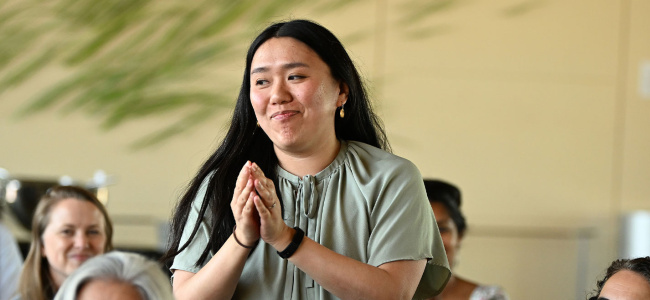
Experience a Culture of Collaboration.
When you join the Michigan Ross doctoral program, you become part of a collaborative cohort of peers eager to exchange ideas, learn from each other’s experiences, and build lifelong relationships. You’ll work under the mentorship of renowned faculty who share your passion for knowledge and will challenge you to go further in your research pursuits.
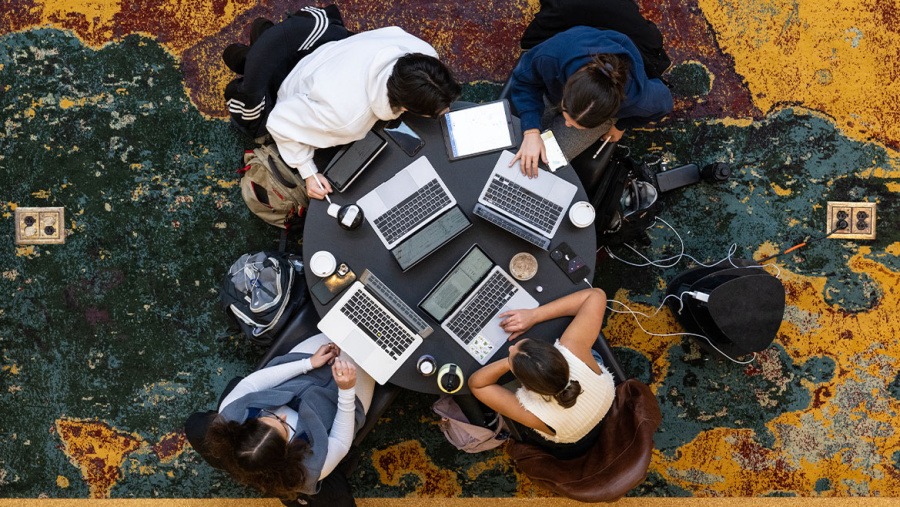
You will find an academic community throughout Ross and the University of Michigan supportive of your research interests within business as well as those outside of it. You can leverage the interdisciplinary learning opportunities offered through the Rackham Graduate School and the thought leadership of the many research centers and institutes found at Ross.
Rackham Graduate School
Public University in the U.S. – QS World University Rankings, 2023
U-M graduate programs in the Top 10 -U.S. News & World Report, 2022
in total research expenditures - FY22 U-M Research Report
Preparing for a career in academia requires a strong support network. With guidance from junior and senior faculty, you’ll gain valuable insights on how to develop your research and succeed in the doctoral program. You’ll also have access to a wide range of academic resources and well-being programs across Ross and U-M.
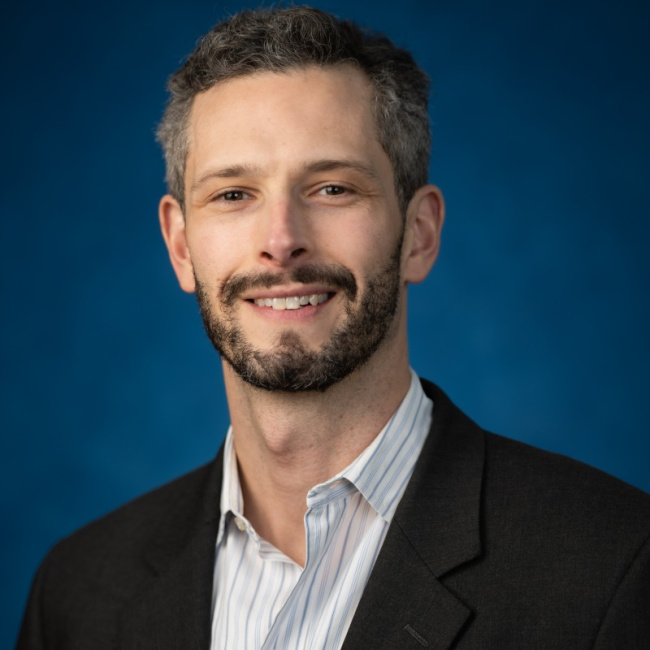
Read what PhD students have to say about their doctoral experience at Michigan Ross.
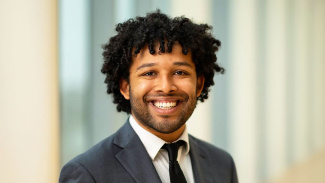
Continue the Conversation
Experience a diverse community at Ross — one that leverages different perspectives to deepen learning, inspire innovation, generate new insights, and unite those with a desire to make a difference.

Discover All that Ann Arbor Has to Offer
Here you will find a vibrant arts and entertainment scene, exciting sporting events, social and cultural activities, and a four-season climate ideal for enjoying the outdoors. The close proximity to Detroit , family-friendly community, and cost of living make Ann Arbor a great place to live and learn.
Contact our team to learn more about the Michigan Ross PhD Program.

- Important documents and information
- Our Student Charter
- University Regulations
- Student Protection Plan
- Communications principles
- Appropriate use of social media guidelines
- Social media pages and groups
- When you arrive
- Welcome schedule
- Welcome checklist
- Supporting you
- International Orientation
- Pre-sessional programme
- Frequently Asked Questions
- Ready for anything
- Student opportunities
- Student Success Festival
- Race Equality Charter
- Students' Union
- Fitness Pod
- Exercise classes
- University sports teams
- Support & development
- News and events
- MDX sports shop
- BRIT 2024 Challenge
- Your Middlesex. Your Voice.
- Your impact
- Become a Student Voice Leader
- Student Complaints and Grievance Procedure
- MDX Programme Survey
- Postgraduate Taught Experience Survey
- Ceremony dates and Schedule
- Student Tickets
- Guest tickets
- Accessibility and special arrangements
- Academic gowns and dress code
- Photography
- Guest and student visas
- Graduation Merchandise
- Graduation DVD
- Getting here
- Terms and Conditions
- After Graduation
- John Smith's Online Store
- Announcements
- Student lifestyle articles
- MDX helps create Covid-safe filming guidelines for students
- Holocaust memorial event staged to remember victims of genocides
- Alumni led sessions
- Hendon campus
- Campus Safety
- Student parking on campus
- Food on campus
- Buildings and facilities
- StoneX Stadium
- Accommodation
- Private rented accommodation
- Life in London
- Environment and sustainability
- Plastic reduction
- Online resources for online study
- Campus Library services
- Special collections for research & inspiration
- Library Support for Disabled Students
- Learning Enhancement
- Support for Academic Writing and Language
- Academic Writing and Language Resource Box
- Support for Maths, Stats and Numeracy
- Maths, Statistics and Numeracy Resource Box
- Who are the Learning Enhancement Team?
- Verity Sage Awards
- IT Services
- Systems Status
- Two-factor Authentication, Cyber Security and Staying safe online
- Print and Copy
- Accessing software remotely
- 'How To' IT guides
- Academic Advisors
- Student Learning Assistants
- Meet your Senior SLAs
- Meet your SLAs
- SLA Newsletters
- SLA Yearbooks
- Academic Integrity
- Developing good academic practice
- Types of study
- Studying at our overseas campuses
- International mobility
- Postgraduate Research Degrees
- Language and Culture Exchange
- Module Registration, Attendance and Engagement, Assessment, and Regulations
- Diploma supplements and certificates
- Extenuating Circumstances and Late Submission
- Results, grading and progression
- Attendance and Engagement
- Module registration
- Assessment FAQs
- What can I copy
- Ownership and related rights
- By types of work
- Ownership and Duration
- Other legal issues
- The Internet
- AI - Artificial Intelligence
- Useful links
- MDX Graduate Competencies
- Unitemps Middlesex
- Working student
- Placements and Internships
- MDXcelerator
- Online resources
- International student support
- Telling your career story
- Your enterprise
- Funding and financial support
- Student loans
- Living Costs Fund
- Scholarships and bursaries
- NHS student travel expenses
- UniHelp - your first point of call for general student enquiries
- Useful forms
- UniHelp 'How to' Videos
- Fees, payments, funding and financial support
- Fees and payment
- Welfare advice
- International students
- International healthcare
- On arrival in the UK
- Your Student Route visa
- After your studies
- EU settlement scheme
- Graduate Route Visa Presentations
- Counselling and Mental Health - CMH
- How can we support you?
- Meet the team
- Resources for you
- Crisis and emergency help
- Disability and Dyslexia Service
- Disabled students' allowance
- North London Regional Access Centre (NLRAC)
- Supporting your progression at Middlesex
- Equality, Diversity and Inclusion
- #BlackLivesMatter and anti-racism
- Changing the Culture
- Report.It.To.Stop.It
- #Stop.Spiking
- Islamophobia Awareness Month
- Health and wellbeing
- Infectious and contagious diseases
- Your online wellbeing platforms
- Our LGBTQIA+ community
- Support for Victims of Domestic Abuse
- Information for student supporters
- Pregnancy, maternity period, adoption and fostering
- I want to know more about self-care
- Register with a GP
- I want to improve my physical health
- I want to make healthier food choices
- I want to know more about sexual health
- I want to improve my sleep
- I want to know more about substance use
- I want to develop my mental fitness and mental health
- I want to know more about student support
- Supporting you through grief
- Care and Concern
- Scholarships and awards
- Ensuring the quality of your programme
- Support and wellbeing if you’re living abroad
- Support for student carers
- Student Callers Team

Close window
Search UniHub
- Home ›
- Student Life ›
- News ›
- Student lifestyle articles ›
- My Experience As A PhD Student
My experience as a PhD student
Claire gives some tips on studying for a phd based on personal experience, #furtherstudy #phd #studentguide, little fish, big pond: learning to swim again.
I can’t do this.
I really can’t do this.
No, hang on, maybe I can.
No, I definitely can’t do this. I absolutely can’t. There’s no way.
Oh, I did it.
My PhD is beyond doubt one of the hardest, most rewarding, confidence- sapping , confidence- boosting , brutal and uplifting academic challenges I have ever faced. The progression from the neatly defined, taught modules of an undergraduate or masters degree to the student-led study required for a PhD is vast. Vast, but absolutely achievable. Simply being accepted onto a PhD programme should give you the confidence that academics believe that you are capable of embarking on such a challenge - and this should remain firmly lodged in your mind as you navigate the academic wilderness ahead.
Don’t go too far down the rabbit hole!
You may find yourself reading a paper, determined to make sense of it all - but as you read on you realise it’s no longer written in English - it’s morphed into a whole new language, and you’re not yet fluent. You begin veering off, researching terms and theories you aren't familiar with. Suddenly you find yourself reading about some obscure topic, totally unrelated to your original search. How did I get here? What was I looking up? Back to paper 1. And so it goes on…! Before you know it, you’ve fallen so deep into the ‘rabbit hole of elusive expertise’ you don’t know which way is up. If this sounds like you, then WELCOME!
Tip: organise your research papers from day one - markup key publications and summarise the findings. Plan out your study day the night before and set realistic, achievable goals - you’ll feel more productive, in control, and be less likely to procrastinate.
Root for yourself
Self-doubt has played a large role in my PhD journey so far. The well-known imposter syndrome manages to rear its critical head at any given opportunity. However, given this phenomenon is written about so extensively, provides evidence (and comfort, perhaps) that it is far more common than might be confessed. Indeed, conversations with colleagues indicate that it is not just us PhD students who might fall prey. One way I deal with these symptoms is to simply accept them. You can’t and won’t possibly know it all. There will always and forever be more to learn. Surely this in itself is why we have embarked on a PhD in the first place? To learn, become experts in our targeted field and then keep on learning…
Tip: explain your research to a friend or family member and encourage them to quiz you on your ideas - this will quickly and clearly flag the bits you are perhaps less certain of and you may want to focus your time on.
Playtime presents perspective
Downtime is crucial when tackling a PhD. It is often so easy to become so absorbed in your research that your perspective becomes warped. You may find yourself living and breathing your PhD, perhaps to the detriment of your own health. Taking time out to reconnect with your hobbies, with friends and family, with nature, are key ways to step back, recalibrate and recharge your batteries. And remember: DON’T FEEL GUILTY for doing so! PhD study can be isolating so you might want to try joining PhD forums. Additionally, get contact details of other students at networking events and conferences - it’s likely they’re feeling the same and would welcome a connection too!
Tip: plan at least one activity you enjoy each day to help you step out of PhD land (I recommend a family-pack of celebrations and back to back reruns of Fawlty Towers).
Supervisory Success
Tip: plan ahead for your team meetings; their time is precious and knowledge vast so you’ll get more out of the meeting if you have clear questions/ideas to present to them for discussion. Most of all, try to develop your own voice - you may feel like the junior but your ideas and opinions are equally as valid!
N.B: A special thanks to my two wonderfully supportive supervisors; Professor Tom Dickins and Dr Mark Coulson!
My take-home message is to embrace the PhD experience. It definitely won’t always be smooth-sailing, it’s going to be tough. But challenges make overcoming them that much sweeter. View your studies as a training programme; you’re learning to master your trade. You will get there but you need to be your biggest supporter.
And chocolate. Chocolate helps.
Student lifestyle posts which reflect the interests of our students are written by student interns working within the Marketing department and do not reflect the research, guidance or opinions of Middlesex University. If you have feedback or want to suggest ideas for future student lifestyle posts, please email [email protected]
In this section.
- COVID-19 - Advice for International Students in the UK
- University Mental Health Day: "Circling Above"
- What will be your #MadeinMDX story?
- Sustainability project winners discuss their ideas for a more eco-friendly MDX
- My 4 fears of uni life and how I overcame them
- Everything you need to know in 1 minute about being a Fresher
- 10 practical things you should do when you first arrive at MDX
- 5 things I wish I’d done when I was a new MDX student
- How to make sure your summer is as productive as possible
- Summer 2018 - London Festivals
- The importance of good sleep and relaxing music during exam season
- Pre Exam Stress Tips
- Anxiety and stress during the exam period
- What it's like to a be an MDX Postgraduate student
- Bringing the Entrepreneurial Spirit to MDX
- Sustainable MDX - what are we doing as a community to protect the environment
- #TeamMDX Celebrates Fairtrade Fortnight and #SheDeserves
- How to boost your Employability at MDX
- Welcome to #TeamMDX
- What does #TeamMDX mean to us?
- 5 reasons why you should Engage in Change
- How And Why To Make Your Voice Heard At Uni
- A Musical Middlesex
- What to look forward to this New Year at MDX
- How to make the most of your Christmas break in London
- A Guide To Winter Activities In London
- Christmas presents on a budget
- How To Survive Your First Year At University
- A festival not to be missed
- The importance of being honest and original in your work
- A touch of the East at Middlesex University
- 5 Useful Things To Do Before Starting Uni
- Money Management
- Keeping the faith – being a Christian student at Middlesex
- The very beneficial link between doing sports and succeeding in your studies
- My first month at Middlesex University as an International Student
- Share your experience at Middlesex University Diary Room
- Conquering Mount Snowdon in preparation for MDX Charity Week Dinner
- Join the MDX plastic reduction movement
- Transitioning To Uni Life - How To Avoid Getting Overwhelmed
- How To Get Over Loneliness At Uni
- 8 Ways To Look After Yourself At Uni
- 2017/18 – MY FAVOURITE YEAR AT MDX
- My summer in Poland: working as an editorial intern
- More than 500 students display talent and creativity at Old Truman Brewery
- Summer 2018-The right time to start your career!
- Gradstock 2018
- Interview with Ivy Ngeow- MDX Alumni and Award-winning author
- Summer Events at Middlesex
- The 11 Truths Of Writing A Dissertation
- 6 Reasons Why You Should Consider Volunteering This Summer
- 8 Fool-Proof Revision Tips
- How to interview a media star
- 5 tips to maintain coursework motivation
- Getting your assignment in on time
- Creating an all-Middlesex dark sci-fi drama production
- 5 Best Places to have Brunch in North London
- Tips On How To Stay Motivated
- MDX women who have inspired me
- International Women's Day
- University Mental Health Day: 5 March 2020
- Let's Start Talking This University Mental Health Day
- Why belonging to a society will enhance your MDX experience
- MDX celebrates London Fashion Week
- Student Life as a Single Parent
- Holocaust Memorial Day: The story of Mala Tribich
- Yoga versus Stress
- Explore, Enrich and Elevate life beyond your studies
- Chinese New Year Celebrations At MDX
- Commuter Students: How to stay in touch with uni life
- The essential things to do when you arrive at uni, from someone who knows
- New Year, New You
- Things to look forward to in 2018
- PG Connect with Apprentice Star Margaret Mountford
- Celebrating the holidays around the world
- 5 reasons why your feedback matters
- Another side to London
- How Middlesex University is working towards a greener future
- How to deal with homesickness when you first move to Uni
- Five tips to become a successful entrepreneur
- Celebrating Christmas around the World
- 5 instant campus cures to a bad day
- Why module selection is so important
- 5 reasons why you should attend the Student Success Festival
- Exam Season - we've got your back
- Things to do over summer
- Student saving tips
- 8 top tips to take care of yourself this #MDXMAS
- a day in the life of kevin lancelot
- #Sustainablemdx – 5 green activities to do while at home
- life in lockdown now studying is over
- Prayer Rooms - health and saftey measures.docx
At home, abroad, working, interning? Wherever you are this summer, contact OCS or make an appointment for a virtual advising session. We are available all summer!
- Undergraduates
- Ph.Ds & Postdocs
- Prospective Students & Guests
- What is a Community?
- Student Athletes
- First Generation and/or Low Income Students
- International Students
- LGBTQ Students
- Students of Color
- Students with Disabilities
- Student Veterans
- Exploring Careers
- Advertising, Marketing & PR
- Finance, Insurance & Real Estate
- General Management & Leadership Development Programs
- Law & Legal Services
- Startups, Entrepreneurship & Freelance Work
- Environment, Sustainability & Energy
- Media & Communications
- Policy & Think Tanks
- Engineering
- Healthcare, Biotech & Global Public Health
- Life & Physical Sciences
- Programming & Data Science
- Graduate School
- Health Professions
- Business School
- Meet with OCS
- Student Organizations Workshop Request
- OCS Podcast Series
- Office of Fellowships
- Navigating AI in the Job Search Process
- Cover Letters & Correspondence
- Job Market Insights
- Professional Conduct & Etiquette
- Professional Online Identity
- Interview Preparation
- Resource Database
- Yale Career Link
- Jobs, Internships & Other Experiences
- Gap Year & Short-Term Opportunities
- Planning an International Internship
- Funding Your Experience
- Career Fairs/Networking Events
- On-Campus Recruiting
- Job Offers & Salary Negotiation
- Informational Interviewing
- Peer Networking Lists
- Building Your LinkedIn Profile
- YC First Destinations
- YC Four-Year Out
- GSAS Program Statistics
- Statistics & Reports
- Contact OCS
- OCS Mission & Policies
- Additional Yale Career Offices
Professional Experiences and Skill-Building for Ph.Ds and Postdocs
There are many ways to gain professional experience as a graduate student, including campus fellowships, internships and leadership positions with one of the many student organizations. Professional experiences can serve a variety purposes, including exploring new industries, learning to apply transferable skills in new areas, learning entirely new skills, and more, and the type of experience that’s most beneficial to you will depend on your goals and background. This page provides information on a range of resources and opportunities, many of which are available directly through Yale.
Part-time Experiences
For many graduate students, it may not be realistic to take a full summer away from research and other obligations. The good news is that there is no shortage of opportunities to gain professional experience that don’t require an onerous time commitment and that can be just as valuable for your career journey as a traditional internship. Part-time work can be carried out during the academic year, and Yale offers opportunities covering many different job functions. Also consider participation in student organizations which builds skills in leadership and project management with a time commitment designed to fit into a graduate student’s schedule.
A number of organizations at Yale also organize opportunities for consulting work, which can range in time commitment from a single weekend to a yearlong project requiring a few hours of work per week. These projects can be a great way to experience working with a team, to learn basic business practices and to see how your skills translate to new areas. You may also consider micro-internships, which give you the chance to do short-term freelance work in your area of expertise.
Summer Internships
In the right circumstances, a full-time summer internship can be an ideal way to explore a career. Tech companies often offer internships explicitly aimed at graduate students, but many other opportunities are open to graduate students even if not advertised to them directly. A number of opportunities are available at Yale, including the President’s Public Service Fellowship.
Keep in mind that GSAS has specific regulations regarding full-time summer internships, as well as part-time work beyond 10 hours per week. If you are interested in these opportunities, you should review the relevant GSAS Academic Regulations in detail and complete the Request for Summer Internship Form if applicable. International students should also consult with an OISS adviser before committing to a position with an outside organization or to any position at Yale beyond 19 hours/week.
Virtual Experiences
In busy periods when even part-time work can’t fit into your schedule, there are still opportunities to build skills and explore careers via virtual experiences and job simulations. These generally involve sample projects provided by real companies using realistic materials and datasets designed to simulate the workflow and process of a particular job function. Yale provides access to several sites that host these opportunities, as well as to resources such as LinkedIn Learning.
News from OCS
Yale university virtual postdoc recruitment event .
- Share This: Share Yale University Virtual Postdoc Recruitment Event on Facebook Share Yale University Virtual Postdoc Recruitment Event on LinkedIn Share Yale University Virtual Postdoc Recruitment Event on X

Yale University’s Office for Postdoctoral Affairs is hosting its Virtual Postdoc Recruitment Event on February 15, 2024 from 1-4pm Eastern Time on Zoom and engages scholars interested in pursuing postdoctoral training at Yale University. Our goals are to support potential …
Internships for International Grad Students: A Step-By-Step Guide
- Share This: Share Internships for International Grad Students: A Step-By-Step Guide on Facebook Share Internships for International Grad Students: A Step-By-Step Guide on LinkedIn Share Internships for International Grad Students: A Step-By-Step Guide on X
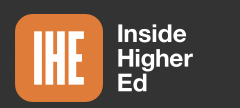
By Leah Collum, November 18, 2019 – see the original post on Inside Higher Ed
Those two little words are all but guaranteed to strike dread into the heart of practically every international graduate student job seeker. It’s a classic catch-22: …
PhD Transferable Skills
- Share This: Share PhD Transferable Skills on Facebook Share PhD Transferable Skills on LinkedIn Share PhD Transferable Skills on X
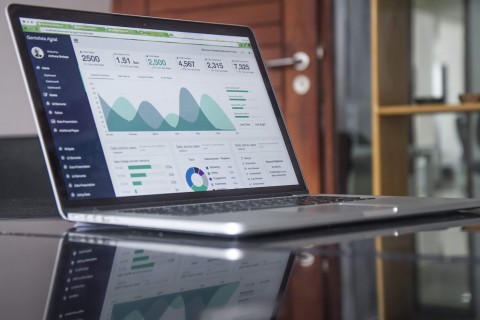
Employers value many skills in addition to the technical knowledge in your discipline that you have honed while at Yale. These skills are called “transferable” because they can be employed in a range of employer settings. The skills most cited …
Experiences at Yale
Ocs career development leadership program, yale center for engineering innovation and design online workshops, yale biotech club programs, yale student business society programs, yale student science diplomats, leadership roles in student organizations, off-campus experiences.
Listed is just a sample of the many opportunities part-time and internship opportunities open to graduate students. Be sure to read our advice on finding internships and also on creating your own opportunity with an employer. For additional support, meet with an OCS adviser.
Rand Graduate Student Summer Associate Program
Phd internships at microsoft research, cdc internships for phd students, how to search for federal internships on usajobs.gov experience with usajobs usajobs, summer internships for graduate students experience with metropolitan museum of art metropolitan museum of art, us agency for international development (usaid) internships, featured virtual experiences, prescouter global analyst program experience with prescouter prescouter, parker dewey micro-internships experience with parker dewey parker dewey, intersect job simulations – humanities and social sciences sims, intersect job simulations – science sims, forage virtual finance programs, skill-building courses.
For more courses, visit LinkedIn Learning , which is free to Yale students and postdocs.
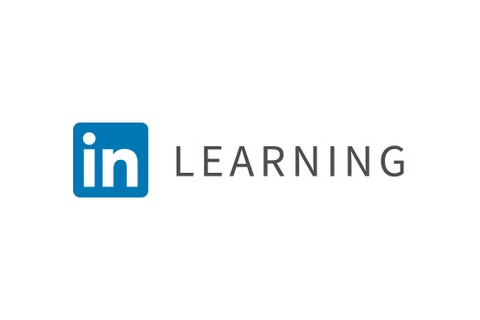
A Day In The Life of a Data Scientist
Become a user experience designer, data visualization: storytelling.
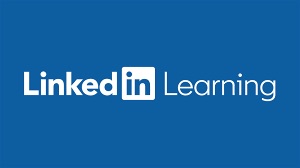
LinkedIn Learning – Discounted Cash Flow Valuation
Contact & location.
55 Whitney Avenue, 3rd Fl. New Haven, CT 06510
SERVICE HOURS
The office is closed weekends, holidays, and recess days .

Office of Career Strategy
Visiting yale.
- Skip to main content
- Skip to main navigation
- Faculty Highlights
- Faculty Publications
- Ph.D. Students
- Contact List
- Employment Opportunities
- Room Request
- Camera Request
- Parking Permit Request
- DTEN Room Reservation Form
Home / Academics / PhD Program / PhD Student Experience
The PhD Student Experience

Our graduate students are working to change the world one research project at a time. They come to us from all over the world to engage in research that deepens knowledge and practice in education.
Here are a few of our graduate students, discussing their experiences in the Education Doctoral Program, their research interests, and their commitments to educational justice and equity.
Melissa Marini Švigelj

Education PhD, with an emphasis in Sociology, 5th year
Grad Slam gives graduate students three minutes to share their research, concisely and compellingly, with a public audience. The 2022 Grad Slam took place March 5 at the Kuumbwa Jazz Center. Melissa Marini Švigelj participated in Grad Slam and won $750 with People's Choice.
More about Grad Slam Here
Charley Brooks

Ultimately, what drew me to Santa Cruz was the personal attention from faculty. Even before starting my program, I spoke with a variety of faculty members and graduate students from all different fields who offered me advice and support in making my decision. I could tell that mentorship was a priority and that my work, however much it varied from my faculty advisor’s, would be nurtured. This impression has borne out during my time at Santa Cruz thus far.
I study social studies education and teacher preparation and am interested in questions about what histories are taught in schools, to whom, and to what effect. I am especially interested in how the histories taught vary based on demographics, commitments, and identity in terms of students, teachers, and communities. Inherent to the teaching of history are issues of race, racism, and whiteness. To study these topics, I utilize qualitative methods including critical discourse analysis which helps to reveal ideologies that underpin language use that are not necessarily evident on the surface. I find that this method is particularly useful in locating whiteness, which is frequently obfuscated especially within historical narratives that are taught in schools and present in textbooks. I’m also interested in developing pedagogical strategies that foster critical awareness and interrogation of power embedded in taken-for-granted historical narratives.
Andrea Del Carmen Vazquez

I’m a Black Latina and a native of South Central Los Angeles . Like many people from my communities, both my parents migrated from Latin America and as such Spanish is my first language. I’m also the first in my family to receive a college degree, even though many of my relatives are far more educated in ways I will never be!
As an Anthropologist of Education, I’m interested in the topographies at the intersections of racial identity, sexuality, and the late liberal state. In particular, I'm interested in learning how schools created ideas of "safety" and "safe spaces", and how this informs queer Latinx youth's antiracist and antihomophobic practices. Queer youth of color are still invisibilized within Education Studies. When education inquiry centers queer youth, traditionally, this is done in regards to bullying and mental health and the research highlights the experience of white queer youth in urban spaces. My ethnography seeks to uncover the agency of queer youth of color from an agro-industrial community with a rich history of migration and social activism.
I chose to do my doctoral work at UCSC because I knew it had amazing scholars within education studies, and in the social sciences more broadly. In addition, UCSC has a long and deep history of critical scholars who paved the way for those of us who are concerned with any deviations of power. I knew I wanted to be part of that academic genealogy.

I have worked as a classroom teacher and as a counselor and therapist. Many of the stories of struggle I heard from my students and clients were directly related to systemic issues in schools and housing, embedded with racism and keeping poor folks poor. After working as best I could from my position as a teacher, counselor, and advocate, I felt strongly pulled to find a way to contribute at a more systemic level. Working as a researcher in education under faculty who perceive teaching and research as a political act, contributing to knowledge production and teaching others who will go out to be the next generation of teachers feels like the most valuable work I could possibly do.
I am interested in the relationships between identity, teacher preparation, and teacher effectiveness with diverse student populations. Specifically, my work focuses on how pre-service teachers become aware of their subjectivity or positionality within their teacher education programs (TEP), how TEPs and policies engender this awareness and how teacher educators interrogate notions of whiteness within TEPs. UCSC supports this work in that I am able to consult with multiple faculty members within the Education department and in other departments (such as Sociology). Furthermore, the social justice orientation of the program encourages a critical lens, especially around issues of equity within schools.
Being a part of this PhD program has broadened my horizons, pushed me out of my comfort zone and encouraged growth in all directions. I feel greatly supported by my advisor, who has sought out teaching and research opportunities for me, and the department's faculty and staff who have encouraged me to follow my interests and supported my academic growth as a writer and researcher.
- Education Major and Minors
- Master of Arts/Credential Program
- PhD Info Sessions
- Current PhD Students
- PhD Student Experience
- Report an accessibility barrier
- Land Acknowledgment
- Accreditation
Last modified: July 31, 2022 128.114.113.87
- PhD Student Life
In This Section
- Economics Track
- Judgment and Decision Making Track
- Politics and Institutions Track
- Science, Technology and Policy Studies Track
- Current Students
- Doctoral Student Handbook
- Dissertations & Job Placements
- Faculty & Research
The full doctoral student experience at Harvard is not just about outstanding academics. It’s also about the community you build, the connections you make, and the many ways for you to grow academically, professionally, and personally.
There are many student organizations and opportunities for you to make your doctoral program experience truly your own—and resources to support you along the way. Those below are just a few.
Kennedy PhD Student Association (KPSA)
The singular focus of KPSA, a student organization, is on building a supportive and healthy community for students enrolled in Harvard Kennedy School-affiliated doctoral programs. Among its responsibilities, KPSA organizes social events, promotes health and well being among doctoral students, and focuses on research development opportunities.
Diversity at Harvard
The Harvard Kenneth C. Griffin Graduate School of Arts and Sciences (Harvard Griffin GSAS) and Harvard is a community of students and scholars who represent different races, ethnicities, belief systems, nationalities, genders, and sexual orientations. There are student groups and resources at Harvard Griffin GSAS and HKS alike that provide opportunities for you to become part of communities and help you thrive academically, develop professionally, and grow personally during your time at Harvard.
Harvard Grad Women in Economics
Housed in the Department of Economics, the Harvard Grad Women in Economics student organization brings together Harvard’s female and non-binary graduate students to build community and work on important issues that affect women’s representation and inclusion in the economics field.
Supporting the Whole You
Harvard Griffin GSAS and Harvard provide a range of resources to support your academic, physical, social, and mental well being as you pursue your doctoral research. Several professional development programs are also available to prepare you for each step as you work toward your doctoral degree.
Among the Harvard Griffin GSAS resources include those that are academically focused, particularly the Bureau of Study Counsel and the Center for Writing and Communicating Ideas . But they also include family-minded resources such as the Harvard Student Spouses and Partners Association and Care.com as well as those focused on your mental health and well being .
Read more about the support programs available to you at Harvard Griffin GSAS and HKS during your time at Harvard.
Research Experience for Prospective PhD Candidates
New section.
Most graduate schools will expect applicants to have practical experience in a lab. A strong application portfolio will most likely include participation in research throughout the undergraduate years, both during the academic year and the summers.
It's important that you pursue research opportunities during the academic year and summers (which provide full-time experience) to immerse yourself in a laboratory/project and to show your commitment and motivation for research. The letters of recommendation from your research mentors are a very important part of your graduate school application.
Making the most of your summer experiences
- Participate in research summer programs throughout the undergraduate years. These can be at your home institution or at other institutions.
- Identify and apply to several summer programs. This will give you a preview of the application process for graduate school.
- Apply to summer programs that take place at schools where you may be interested in pursuing your graduate degree.
- Complete and submit the application materials during the prior winter/spring.
- Become fully immersed in the research projects that you work on.
- Talk with advanced students and faculty advisors about graduate school and their experiences.
- Take advantage of other skill-building activities that the summer program offers.
Finding opportunities
- Summer Undergraduate Research Programs.
- NIH Summer Internship Program in Biomedical Research.
- NIH Undergraduate Scholarship Program.
Baylor College of Medicine/National Science Foundation brochure on the importance of summer research experience.
Helpful tools and information regarding medical MD-PhD programs.
Helpful tools for those applying to medical PhD programs
An official website of the United States government
The .gov means it’s official. Federal government websites often end in .gov or .mil. Before sharing sensitive information, make sure you’re on a federal government site.
The site is secure. The https:// ensures that you are connecting to the official website and that any information you provide is encrypted and transmitted securely.
- Publications
- Account settings
Preview improvements coming to the PMC website in October 2024. Learn More or Try it out now .
- Advanced Search
- Journal List

Highlighting the positive aspects of being a PhD student
Camille bernery.
1 Laboratoire Écologie Systématique Évolution, Université Paris-Saclay, CNRS and AgroParisTech Orsay, France
Léo Lusardi
Clara marino, martin philippe-lesaffre, elena angulo.
2 Estación Biológica de Doñana, CSIC Sevilla, Spain
Elsa Bonnaud
Loreleï guéry.
3 UMR Plant Health Institute of Montpellier, CIRAD and INRAE Montpellier, France
Eléna Manfrini
Anna turbelin, céline albert.
4 Senckenberg Biodiversity and Climate Research Centre Frankfurt am Main, Germany
5 Smithsonian Conservation Biology Institute Front Royal, United States
Franck Courchamp
Associated data.
All data generated or analysed during this study came from Twitter API and cannot be shared.
Articles about doing a PhD tend to focus on the difficulties faced by research students. Here we argue that the scientific community should also highlight the positive elements of the PhD experience.
Introduction
Doing a PhD can be both demanding and rewarding. In addition to overcoming the scientific and intellectual challenges involved in doing original research, a PhD student may also have to deal with financial difficulties, an unhealthy work-life balance, or resulting concerns about their mental health ( Woolston, 2017 ; Auerbach et al., 2018 ; Oswalt et al., 2020 ; Evans et al., 2018 ). Despite all this, most PhD students seem satisfied with their decision to do a PhD, mostly because they work in stimulating environments with a high degree of independence and good supervision ( Pommier et al., 2022 ; Woolston, 2017 ).
Paradoxically, however, the fact that most PhD students are positive about doing a PhD is not always apparent to the outside world. For example, the present authors recently analysed more than 90,000 tweets about the PhD experience: almost half of the tweets were positive, and less than a sixth were negative, yet the negative tweets received more likes and retweets ( Figure 1 ). What can be done to counter such misleading and negative impressions? In this article we – a group of PhD students, postdocs and permanent academics – highlight the positive elements of doing a PhD in order to present a more balanced view of the whole PhD experience. We also make recommendations to maintain a positive momentum throughout the PhD. Although these ideas and recommendations are based on our experiences as researchers in ecology working in Europe, we feel that most of the points we make also apply in other disciplines and places.

We retrieved all tweets posted in the English language during 12 consecutive weeks, from September to December 2021, that contained any of the following six hashtags: #phdlife, #phdspeaks, #phdvoice, #phdchat, #phdtips, #phdstudent. We then measured the sentiment (positive, negative or neutral) associated with each original tweet (excluding retweets). Of the 91 229 tweets we retrieved, 43,941 were positive, 12,298 were negative, and 34,990 were neutral. Mann-Whitney U tests were performed to compare the average number of likes and retweets of positive versus negative tweets. Negative tweets received significantly more likes than positive tweets (14.5 vs 12.3; P <0.001); negative tweets were also retweeted more than positive tweets but the difference was not significant (1.7 vs 1.5; P =0.383). The Twitter API and the “rtweet” R package ( cran.r-project.org/web/packages/rtweet/vignettes/intro.html ) were used to retrieve the tweets; the “syuzhet” R package ( rdrr.io/cran/syuzhet/ ) and the Bing lexicon ( Liu, 2012 ) were used for the sentiment analysis; all analyses were performed with R software ( R Development Core Team, 2021 ).
Three benefits of doing a PhD
There are two primary outputs from a PhD: new skills and expertise for the graduate, and new knowledge for the wider world. In this article we focus on the former and discuss the three main benefits of doing a PhD for the individual: (i) the development of specific skills to become an expert; (ii) the ability to work in a collaborative environment; (iii) improved communication skills while sharing knowledge ( Figure 2 ). For each of these benefits we discuss both general aspects that apply to most doctoral students, and specific aspects that depend on the student’s supervisor, field of research, location and other factors.

The three primary benefits of doing a PhD are acquiring expertise (pink circle), learning to work in a collaborative environment (blue), and developing communication skills for sharing knowledge (yellow). For each benefit, general aspects that apply to almost all doctoral students are shown in bold type in the small circle, and specific aspects that depend on, for example, the student’s supervisor or field of research are shown in plain type in the large circle. The large grey area contains more abstract and subjective ideas that are not discussed in the main text. It should be noted that this figure is conceptual, and that the aspects and ideas in it could be grouped in other, equally valid, ways.
Becoming an expert
Throughout a doctoral project, a PhD student will develop many of the skills needed to grow into an independent researcher, while also developing expertise in a given field. In addition to learning a great deal about their own field – and adding knowledge to it – a PhD student will learn how to perform a variety of tasks, and thus acquire new transferable skills. These will include autonomy, critical thinking, organization and planning, resilience, and the ability to design, lead and carry out projects. Furthermore, unlike postdocs and principal investigators, who have to carry out various management and administrative tasks, PhD students are usually free to dedicate their working hours almost exclusively to academic pursuits that they are (or can become) passionate about. This freedom is one of the aspects that make the PhD experience unique, and it should not be overlooked or taken for granted. Unfortunately, not all PhD students benefit from or are aware of such autonomy, but this ought to be an objective for all PhDs.
A PhD does not consist of a number of uneventful years that culminate in a single success. Rather, there are many steps along the way – such as mastering a technique, completing a series of experiments or activities in the field, or finishing the first draft of a manuscript – and the feeling of accomplishment that comes with each completed milestone should be a source of pride to the student.
Working in a collaborative environment
Learning how to work with other researchers is an important part of getting a PhD. The PhD student’s most important working relationship is with their supervisor (or, in some cases, supervisors), but most PhD students will also have the opportunity to collaborate with other members of their research group or lab, or even with researchers from the wider community. Working on other projects from time to time can help the student’s own project through increased productivity and creativity; moreover, it can strengthen lab cohesion, and might even lead to the student being a co-author on a paper. Additionally, supervising undergraduate students – or even new graduate students – is a good way of acquiring management skills.
Conferences are another way to meet and interact with other researchers. In particular, they are an opportunity to discover, discuss and be inspired by the work of other scientists. Conversations at conferences can generate new research questions or ideas for new and improved ways to tackle existing questions. Moreover, presenting results at a conference gives students a chance to receive feedback, to be recognized as active researchers by their peers, and to build a professional network.
Collaboration also can happen through the many virtual communities that PhD students can join for technical, scientific or moral support. For example, the Global PhD Server enables doctoral students to discuss their experience, exchange anecdotes, and offer or seek help. The @PhDForum supports a variety of activities, such as writing sessions for PhD students working on papers or chapters of their thesis, while Stack Overflow is a good place to offer/seek help with coding and statistics.
Developing communication skills
The ability to communicate results is a crucial skill for any researcher. A PhD student will, for example, be required to present their work to other scientists as talks or posters at meetings and conferences. The student will also start learning how to write a scientific article. Moreover, there are many opportunities for PhD students to share their passion and knowledge about their field, such as teaching and mentoring undergraduates and other graduate students. They can also get involved in public outreach, and contribute to awakening new passions or educating citizens on certain topics.
Recommendations
Along the PhD journey, neither the doctoral student nor the supervisor will have full control over what will happen. Some things will go wrong, which is why it is important to remain positive and try to make the most of what is a unique opportunity. Ways for the student to remain positive include going back to old pages in their laboratory notebook to see how much progress has been made, and keeping a note of all the positive feedback from different people. It is also important to remember that one does not become a PhD student by chance – being accepted to do a PhD is an achievement in itself. Additionally, sharing preliminary results with other members of the group and attending social events of a lab can build a supportive working atmosphere and help students to stay positive.
Focusing only on research can sometimes be exhausting, so spending time on other activities – such as supervising students, teaching, or working on outreach – can break the monotony and generate a sense of progress. Finally, it is important to celebrate achievements, such as a first draft, an accepted paper, a conference presentation or the submission of a grant proposal (and, obviously, a successful grant proposal). These achievements can be celebrated in the real world, on social media – or both! By regularly highlighting positive outcomes, it is easier to recognise that past difficulties have been overcome, that progress has been made, and that expertise, skills and knowledge have been gained.
In parallel, it is important to try to limit the impact of the negative aspects of the PhD experience, for they are real and various, and can be crushing if left unchecked. First, it is essential to contextualize them. For example, bear in mind that failure is an integral part of progress, and is often just a temporary setback as opposed to a defeat. This is especially true when a manuscript is rejected by a journal: viewing the rejection as an opportunity to improve the manuscript, and acknowledging that the reviewer reports are about the science, not the authors, can help reframe rejections in a positive light. After all, even the most distinguished researchers have experienced rejection many times. Moreover, as highlighted above, science is a collective adventure, and one is rarely alone when help is sought out. In this regard, talking about the challenges one encounters during a PhD with other students or researchers can also help put these challenges into perspective and to see the positive aspects.
The relationship between the PhD student and their supervisor will likely have a big influence on the PhD experience. However, it is important to recognize that this relationship works both ways, and both stand to benefit if it works well. Among other things, the PhD students can help their own cause by being clear on the type of feedback they want, or by scheduling regular meetings focused on their PhD – and persisting even if their supervisor is busy ( Kearns and Gardiner, 2011 ).
We would also encourage supervisors to be positive in their interactions with their PhD students, and to build a global productive environment that could benefit the PhD student ( Andreev et al., 2022 ). Supervisors could, for example, praise PhD students when the opportunity arises, and ensure that criticism is always constructive – and also encourage other members of their lab to do the same.
PhD students may also face challenges that cannot be overcome with positive thinking. Abusive behaviours such as bullying, harassment or discrimination should be reported to the relevant authorities immediately.
Some PhD students will also be anxious about their future job prospects, especially if they hope to remain in academic research. One way to help reduce such anxiety is to clarify life/career goals and identify the steps needed to reach them. For example, if the student makes a list of all potential funding opportunities (including deadlines) at the start of their last year, it will help them plan for the future and relieve some of the pressure that will build up towards the end of their PhD. Building a professional network can also help with career planning, and attending conferences and establishing collaborations are crucial in this regard.
Finally, if needed, it is entirely acceptable for a PhD student to take a break during their PhD, to refocus on what they really want in life, or to even leave their PhD without finishing it if they realize that it is not for them. However, before making such a decision, we would encourage the student to ask themselves if the doubts they are experiencing are due to a momentary difficulty that will pass, or if a PhD is not really the right career path for them.
Doing a PhD is a unique experience that typically occupies three or more years of someone’s life. Through this experience the student will be enriched by acquiring a range of professional and personal skills, and by gaining a prestigious qualification. In the end, it is in the interest of everyone – the PhD student, the supervisor, their colleagues, their institutions, and academia in general – to make this experience as positive as possible.
Acknowledgements
The authors thank the internal reviewers (Céline Bellard, Eva Delmas, Christophe Diagne and Xavier Fauvergue) for useful recommendations. Work on this paper began during a lab retreat attended by all co-authors. PhD students were funded by the French Ministry of Higher Education (CB, LL, CM, MPL); postdocs were funded by the Senckenberg Biodiversity and Climate Research Centre (UA), the Biodiversa ERA-Net AlienScenario project (AT), and the AXA Research Fund Chair for Invasion Biology of University Paris-Saclay (EA, CA, EM); Tenured academics salary were funded by the University Paris-Saclay (EB), the CIRAD (LG) and the CNRS (FC). MPL was also funded as an intern by the ENS Paris-Saclay during part of the project.
Biographies
Camille Bernery is in the Laboratoire Écologie Systématique Évolution, Université Paris-Saclay, CNRS and AgroParisTech, Orsay, France
Léo Lusardi is in the Laboratoire Écologie Systématique Évolution, Université Paris-Saclay, CNRS and AgroParisTech, Orsay, France
Clara Marino is in the Laboratoire Écologie Systématique Évolution, Université Paris-Saclay, CNRS and AgroParisTech, Orsay, France
Martin Philippe-Lesaffre is in the Laboratoire Écologie Systématique Évolution, Université Paris-Saclay, CNRS and AgroParisTech, Orsay, France
Elena Angulo is in the Estación Biológica de Doñana, CSIC, Sevilla, Spain and the Laboratoire Écologie Systématique Évolution, Université Paris-Saclay, CNRS and AgroParisTech, Orsay, France
Elsa Bonnaud is in the Laboratoire Écologie Systématique Évolution, Université Paris-Saclay, CNRS and AgroParisTech, Orsay, France
Loreleï Guéry is in the UMR Plant Health Institute of Montpellier, CIRAD and INRAE, Montpellier, France
Eléna Manfrini is in the Laboratoire Écologie Systématique Évolution, Université Paris-Saclay, CNRS and AgroParisTech, Orsay, France
Anna Turbelin is in the Laboratoire Écologie Systématique Évolution, Université Paris-Saclay, CNRS and AgroParisTech, Orsay, France
Céline Albert is in the Laboratoire Écologie Systématique Évolution, Université Paris-Saclay, CNRS and AgroParisTech, Orsay, France
Ugo Arbieu is in the Laboratoire Écologie Systématique Évolution, Université Paris-Saclay, CNRS and AgroParisTech, Orsay, France, the Senckenberg Biodiversity and Climate Research Centre, Frankfurt am Main, Germany, and the Smithsonian Conservation Biology Institute, Front Royal, United States
Franck Courchamp is in the Laboratoire Écologie Systématique Évolution, Université Paris-Saclay, CNRS and AgroParisTech, Orsay, France
Competing interests
No competing interests declared.
Author contributions
Conceptualization, Formal analysis, Visualization, Writing – original draft, Writing – review and editing.
Conceptualization, Writing – review and editing.
Conceptualization.
Conceptualization, Visualization, Writing – review and editing.
Conceptualization, Supervision, Writing – original draft, Writing – review and editing.
Data availability
- Andreev A, Komatsu V, Almiron P, Rose K, Hughes A, Lee MY. Welcome to the lab. eLife. 2022; 11 :e79627. doi: 10.7554/eLife.79627. [ PMC free article ] [ PubMed ] [ CrossRef ] [ Google Scholar ]
- Auerbach RP, Mortier P, Bruffaerts R, Alonso J, Benjet C, Cuijpers P, Demyttenaere K, Ebert DD, Green JG, Hasking P, Murray E, Nock MK, Pinder-Amaker S, Sampson NA, Stein DJ, Vilagut G, Zaslavsky AM, Kessler RC, WHO WMH-ICS Collaborators WHO World Mental Health Surveys International College Student Project: Prevalence and distribution of mental disorders. Journal of Abnormal Psychology. 2018; 127 :623–638. doi: 10.1037/abn0000362. [ PMC free article ] [ PubMed ] [ CrossRef ] [ Google Scholar ]
- Evans TM, Bira L, Gastelum JB, Weiss LT, Vanderford NL. Evidence for a mental health crisis in graduate education. Nature Biotechnology. 2018; 36 :282–284. doi: 10.1038/nbt.4089. [ PubMed ] [ CrossRef ] [ Google Scholar ]
- Kearns H, Gardiner M. The care and maintenance of your adviser. Nature. 2011; 469 :570. doi: 10.1038/nj7331-570a. [ CrossRef ] [ Google Scholar ]
- Liu B. Sentiment analysis and opinion mining. Synthesis Lectures on Human Language Technologies. 2012; 5 :1–167. doi: 10.2200/S00416ED1V01Y201204HLT016. [ CrossRef ] [ Google Scholar ]
- Oswalt SB, Lederer AM, Chestnut-Steich K, Day C, Halbritter A, Ortiz D. Trends in college students’ mental health diagnoses and utilization of services, 2009-2015. Journal of American College Health. 2020; 68 :41–51. doi: 10.1080/07448481.2018.1515748. [ PubMed ] [ CrossRef ] [ Google Scholar ]
- Pommier S, Talby M, Auffray-Seguette M, Dalaut M, Eijsberg H, Elshawish P, Muller H. Le doctorat en France Regards croisés sur la formation doctorale. Réseau National de Collèges Doctoraux. 2022. [June 28, 2022]. https://hal.archives-ouvertes.fr/hal-03494721
- R Development Core Team . Vienna, Austria: R Foundation for Statistical Computing; 2021. https://www.r-project.org/index.html [ Google Scholar ]
- Woolston C. Graduate survey: A love–hurt relationship. Nature. 2017; 550 :549–552. doi: 10.1038/nj7677-549a. [ CrossRef ] [ Google Scholar ]
- Undergraduate
- Master of Accounting
- Full Time MBA
- Evening Executive MBA
- Weekend Executive MBA
- Charlotte Executive MBA
PhD Student Experience
Spoiler alert: It’s nothing like your undergraduate years.
Research collaboration
Faculty mentors point the way. You push the boundaries to new knowledge.
“When I first started my doctoral program, I was pretty lost — I had no idea how to navigate the process of starting a research project. After spending about a week agonizing about this, I talked with two students in my program, who told me to start building relationships with faculty in our department. After a series of one-on-one meetings, I formed collaborations with two faculty members and, by the end of the semester, began building a relationship with my advisor, Shimul Melwani . I learned that relationships are important — and that it’s okay to ask others for help and guidance.” — Angelica Leigh (PhD ’20)
Teaching others
What you teach will drive you. Who you teach will inspire you.
“I thoroughly enjoyed my teaching experience in the PhD program. I loved having the opportunity to take my passion for business strategy and translate it into classroom discussions with our undergraduate students. I was impressed by the caliber of the students here at Carolina, and I felt like I learned just as much from our group discussions as the students did. It was both energizing and inspiring, which helped not only my teaching but also my research and other areas of life. Overall, I loved the feeling that I was helping to make a difference in these students’ lives and education.” — Travis Howell (PhD ’20)
Our PhD students
- Daphne Armstrong
- Brigham Brau
- Junyoung Jeong
- Rebecca Manning
- Ginger Scanlon
- Turk Al Sabah
- José Ernesto Aldana Vizcaíno, Real Estate
- Robert Alvarez
- Roy Chen-Zhang
- Mohit Desai
- Michael Gropper
- Matthew Johnsen
- Greg Leonard
- Richard Maxwell
- Naman Nishesh
- Ravi Ranjan
- Zipei Zhu, Real Estate
- Margaret Cai
- Mithila Hegde
- Carlos Siri
- Rahul Suhag
- Jasmine Wei
- Andrey Makhanov
- Zhanzhi Zheng
- Zahra Ziaei
- Ricky Burgess
- Sofia-Jeanne Caring
- Herrison Chicas
- Natalie Croitoru
- Terence McElroy
- Fernando Quijano Franky
- Daniela Rodriguez-Mincey
- Trish Staats
- Alyssa Tedder-King
- Olivia Walker
- Angie Fairchild
- Natalie Holzaepfel
- Kyungsoo Kim
- Christopher Law
- Kyung Suk Lee
- Brandon Prettyman
- Yoojeong Shin
Related News
In other news: may 2024.
Award-winning research, global sustainability leadership, a hero twice in one day and more highlights from the UNC Kenan-Flagler community
In other news: March 2024
Faculty awards, celebrating Thomas Kenan III, and more highlights from the UNC Kenan-Flagler community
The impact of quantum computing
Eric Ghysels said the new technology is a “paradigm shift” that will impact financial decision-making and internet security.
This website uses cookies and similar technologies to understand visitor experiences. By using this website, you consent to UNC-Chapel Hill's cookie usage in accordance with their Privacy Notice .
- News & Resources
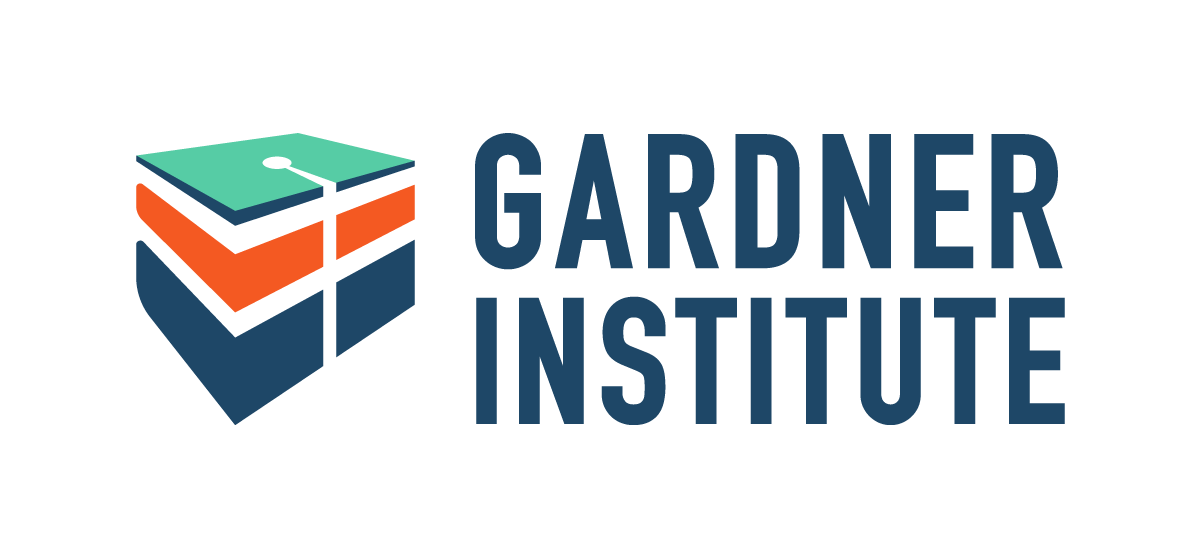
- Partnerships
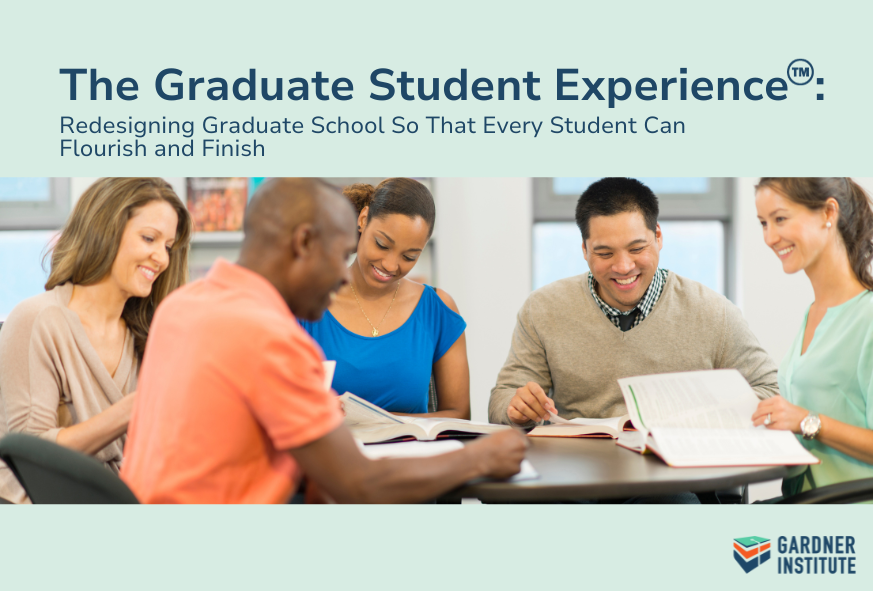
The Graduate Student Experience™
Redesigning graduate school so that every student can flourish and finish, march 25-27, 2024.
Asheville, NC
Discover the untapped potential of graduate education at The Graduate Student Experience™ conference. While much attention has been focused on undergraduate education, it’s time to give graduate students the same level of consideration. Join us as we discuss holistic approaches to student success, covering topics such as retention, mental health, and career preparation. By attending, you’ll help shape the gold standard for global graduate education and better serve our nation’s interests.
Don’t miss this opportunity to contribute to the future of graduate education.
This event is featured in news articles below:
Elon Faculty and Staff Lead Conference Session on First-Generation Graduate Students
Chronicle Article “A New Player Enters the Graduate-School Game”
While undergraduate education has received much attention over the past forty years, with specific focus on concrete ways to increase student success (e.g. “first year experience”), the same attention has not been paid to graduate students. We think it is time for a more deliberate set of efforts to increase student success using a holistic perspective that addresses student retention, progression, and completion rates, mental health and wellbeing, and career preparation. We are inviting your participation in the inaugural convening to discuss improving the graduate school experience in order to better serve our national interests as the gold standard for global graduate education.
Call to Action
Students elect to attend graduate school for a variety of reasons. The job market is increasingly competitive. With nearly 24% of American citizens holding a bachelor’s degree (US Census Bureau, 2022), many are looking to receive advanced training to better position themselves in a broad market. The professoriate will continue to grow and require advanced degrees to become academic leaders. Industry leaders increasingly hold advanced degrees, which bolster innovation, entrepreneurship, and global impact.
Our aim is threefold: to reduce graduate student withdrawals and separations, enhance student experience and wellbeing, and strengthen post-graduate outcomes. Our focus begins at the point of matriculation and extends to graduation and beyond. We are focused on holistic approaches to retention, progression, and completion.
Innovate with Us: Transform Graduate Education
- graduate school administrators
- graduate faculty and staff of graduate colleges/schools
- graduate academic affairs / student affairs/ student success administrators
- student success researchers in higher education
- foundation program officers state
- coordinating/governing board staff
We seek participation from faculty, staff, and administrators representing colleges and universities that offer research-heavy graduate programs as well as those that offer primarily professional degrees, that are seeking evidence-based approaches to better understand and support the graduate student experience.
Utilizing presentations, brainstorming, problem-solving interactions, and small group shareouts, the sessions will focus on institutional practices and case studies that highlight innovative approaches to graduate student success. Shared resources may include white papers and/or proposals for edited volumes.
Concurrent Session Topics:
- wrap-around services to address food & housing insecurity
- the changing demographics of graduate students as adult learners
- mental health and wellbeing
- family formation and career building
- mentorship models – for peers and advisers
- research interest and initiatives for those who study the graduate student experience
- developing, refining and applying better data on the graduate student experience
- curricular and co-curricular approaches to career development
- workforce readiness
- teaching preparation and faculty development for the future professoriate
- financial literacy
- professional development academies
- the important role of cultural affinity groups
Session Types
Concurrent sessions will be action focused:
- Presentation: 60-minute presentation including 15 minutes for discussion
- Small working group or Roundtable Discussion: Meetings around a common theme or issue: 60 minutes for convening, conversation, sharing out and identification of action items
- Panel discussion: 60 minutes, moderated, with 3 or more panelists
- Case studies: 60 minutes. Highlight institutional efforts, may focus on one or more institutions
- Resource creation: 60 minute. Discussion to develop better data collection or scholarship on the graduate student experience
- Workshop: 2-3 hours for both a didactic and interactive session
The Risk and the Resistance – Dismantling the Toxicity in the STEM Ecosystem
Presenter: Dr. Ebony McGee , Professor of Innovation and Inclusion in the STEM Ecosystem at Johns Hopkins University’s School of Education, Department of Mental Health, Johns Hopkins University
This presentation delves into the intricate landscape of the STEM ecosystem, scrutinizing the prevailing risks associated with its current state and demographics. A thorough exploration of empirical findings will shed light on racialized stress and fatigue especially in Black communities. We will delve further into the role of advancing technologies such as artificial intelligence, and their implications, amplifying both the opportunities and the problems in the landscape. An analytical retrospective into the history of STEM will elucidate how we arrived at this juncture. The factors influencing the role of STEM institutions and companies in potentially perpetuating or mitigating these issues will also be identified.
The second part of the presentation will outline the consequential impact of these risks on individuals and communities within STEM. The concept of the ‘Recovering Engineer’ and facets like the ‘Black and Pink Tax’ will spotlight the existing inequities. The strain on brilliant individuals grappling with economic difficulties and the psychological impact manifesting as Impostor Syndrome will be addressed.
Finally, we will step into the realm of resistance, exploring practical strategies for combatting these issues. We will examine the importance of stereotype management, the necessity for ethical considerations within this equity conversation, and the potential of social network analysis towards fostering a supportive environment. The presentation concludes with a revolutionary proposal to dismantle the toxicity in the STEM ecosystem, invoking the principles of Afrofuturism as an empowering vision for a racially and socially equitable STEM future.
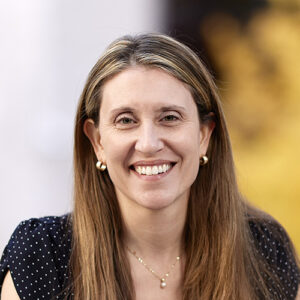
Building Bridges in Graduate Education: Wrap-around services and the vital role of community in fostering student success
Presenter: Alyssa Crittenden , Vice Provost for Graduate Education and Dean, Graduate College, University of Nevada, Las Vegas
Many university administrators were drawn into graduate education to make a difference. For me, this was a call to disrupt inequitable systems in higher education. While we have known for decades that graduate training (particularly at the doctoral level) needs serious renovation, systemic change is slow across the U.S. university system. Many approaches to reducing structural barriers focus on building recruitment pathways, changing admissions policies, and providing additional graduate funding, particularly for first-generation college, low-income, and/or students from underrepresented communities. There is very little discussion, however, of the critical need to recognize and cultivate the knowledge, skills, and strengths that historically marginalized students bring to graduate education. Using case studies from the University of Nevada, Las Vegas (UNLV), I highlight the central role that wrap-around services and community building play in the establishment of holistic support structures. I highlight efforts to reduce housing, food, and technology insecurity and the expansion of cultural affinity groups and programming on campus. This work represents the ongoing process of building bridges between university administrators, faculty, staff, students, and the communities we serve. I argue that this type of ongoing collaboration and a shared commitment to equity are key to effecting meaningful change in graduate education.
Addressing Silos: A Shared Vision of Student Success For Undergraduate and Graduate Students
Drew Koch , CEO, Gardner Institute
All of us are familiar with the organizational silos found at our own institutions. Two of the biggest and unchallenged silos are undergraduate and graduate education, lumbering on in peaceful but separate co-existence. Leaders from the Gardner Institute, John N. Gardner the Co-Founder and Drew Koch the CEO, will address two considerations:
- Why is a non-profit organization focused on undergraduate student success turning its attention to graduate student success; and how might this relate to the interface of undergraduate and graduate education at your institution?
- How to explore the ideal integration of undergraduate and graduate education at your institution for the purposes of producing more successful students at all levels. And how might you organize and pursue an internal process to do just that? The academy has 40+ years of improving the success of first-year students. It is time to expand the model for even greater impact.
Presentations
Academic learning environments & graduate student sense of belonging.
Presenter: Steve Desir , Assistant Professor of Research, Rossier School of Education and Director of Professional Learning & Organizational Development, University of Southern California
In graduate education, the lab, classroom, and candidacy exam are all designed to provide graduate students with opportunities to build their scholarly identity and knowledge as academic professionals. Panelists will present emerging research designed to increase awareness of how these learning environments function as racialized and gendered spaces that can advance or inhibit graduate students’ sense of belonging in their disciplinary communities. This research panel is designed to provide faculty and graduate program administrators who are interested in advancing equity in graduate education with the skill-set to identify issues of race and gender that emerge in academic learning environments.
The Great Unknown: Discussions on How to Gain Insight into Graduate Student Success Nationally
Presenter: Brent Drake , Senior Vice President for Operations and Research
Thanks to almost two decades of institutional data collection from the National Center for Education Statistics it is easy for an individual to discover that of all degree seeking undergraduate students that started at a postsecondary institution in fall 2013, 37.2% that started at a two-year institution had completed an award by fall 2021, and 52.0% who had started at a four-year institution had completed an award. Given the long history of submitted data, we can examine graduation rates for multiple entry cohorts by institutional characteristics, time to degree, student sex, student race/ethnicity, student first-year loan status, and student Pell awards. Obviously, this level of insight allows policy makers and institutions to drive student success efforts at the undergraduate level. Unfortunately, there is no comparable set of nationally collected data on the success of graduate students. This presentation will focus on the state of what data is currently available at a national level. It will then present an admittedly incomplete measures of disaggregated success that can be derived from it. Finally, potential frameworks for filling the data gap will be discussed. Participants will have an opportunity to brainstorm and discuss a potential path forward to allow for greater insight into the success of graduate students nationwide.
Registration and Fees
$445, including opening session dinner, and breakfast and lunch on March 26 and 27.
Full-time Graduate Students: $150
Register four people from your institution and the Dean or Associate Dean of the Graduate School attends for free. To take advantage of this deal register 4 people and then email [email protected] and we will send you a code to register the Dean or Associate Dean.
The registration fee includes dinner, two breakfasts, two lunches, refreshment breaks, and conference materials.
Refund Policy: There will be no refunds given after February 1, 2024. All refunds will be subject to a 5% processing fee. Registration can be transferred to another participant before March 15th, no transfers will be allowed after that. Requests must be made in writing to [email protected] .
Share your participation
Download Attending social media post
Download Presenter social media post
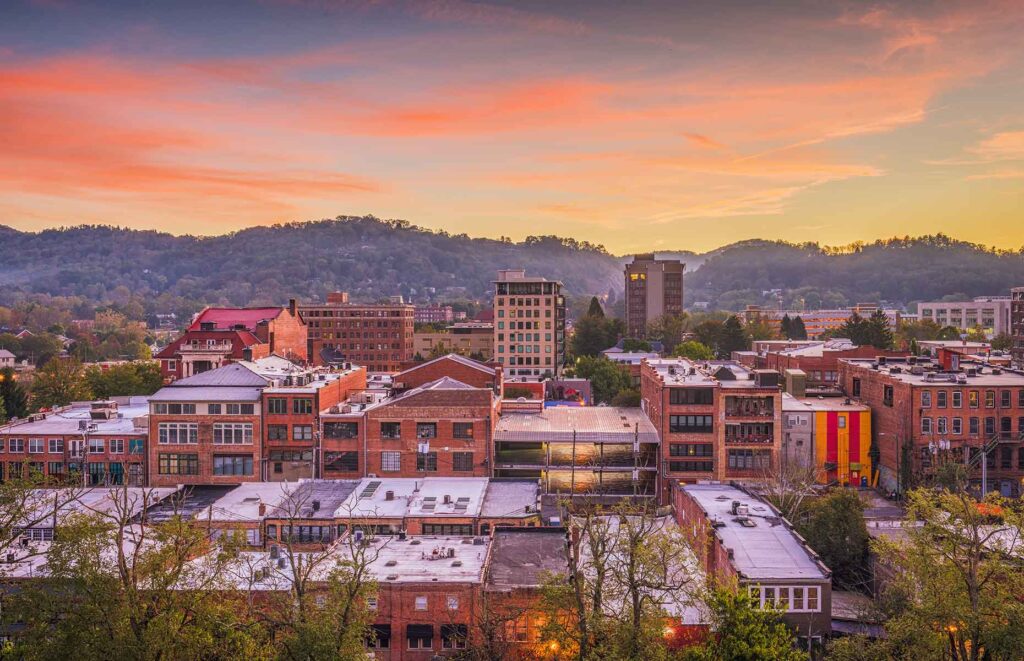
Conference Location Information:
Asheville, North Carolina.
Asheville offers robust cultural offerings through its large array of independent businesses that serve up an eclectic mix of food, art, tours, music, and goods all in the beautiful Blue Ridge Mountains. The city caters to foodies and art lovers!
Hotel Information:
The block of rooms for this event is now closed. but there are still rooms available at the Doubletree.
Doubletree, Biltmore is located minutes from the shops and restaurants of Biltmore Village and the historic Biltmore Estate, with easy access to the Blue Ridge Parkway.
Air Service:
Asheville is served by both its own regional airport (AVL), 15 miles from the hotel, and by the nearby (about 50 miles) Greenville/Spartanburg (GSP). Airlines providing service directly into AVL are: Allegiant, American, Delta, Jet Blue, Sun Country, and United
- Contact Details
- Organizer Name: Gardner Institute
- Email: [email protected]
Related Events
Teaching and learning academy information meeting, curricular analytics community information meeting, featured events.
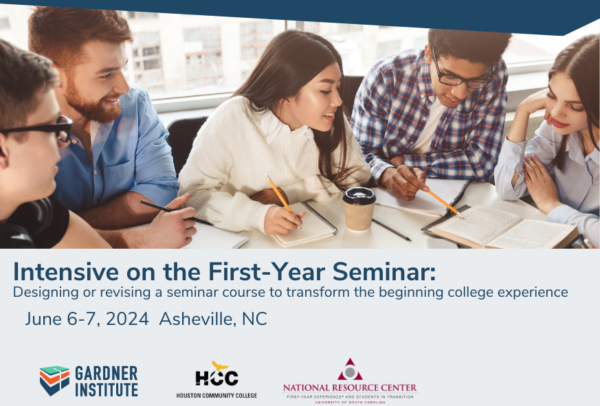
Intensive on the First Year Seminar
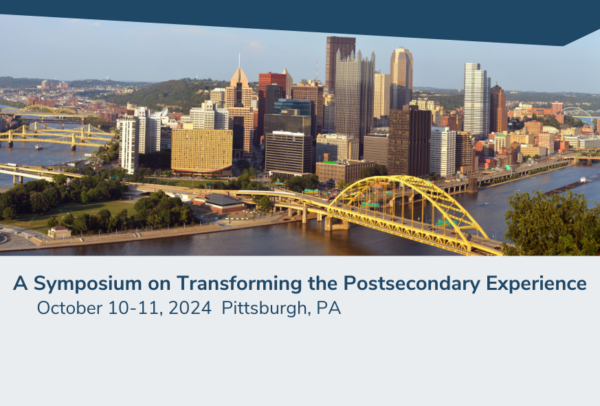
A Symposium on Transforming the Foundational Postsecondary Experience 2024
Launching the first-year experience movement: an interview with john gardner and dan friedman, event types.
- Expertise Sharing
- In-Person Convening
- Information Meeting
- Lessons Learned: Insights for Authors Transforming Higher Education
- Transformative Conversation
Connect With Us
Useful links, news & updates.
Sign up to receive the latest updates and resources from the Gardner Institute.
List choice Ovatheme
EGovt Template - Mad UX © 2020. All Rights Reserved
© 2024 john n. gardner institute for excellence in undergraduate education. all rights reserved..
Search this site
Phd program menu, phd program, phd student experience.
While rigorous and challenging, our program also is small and supportive.
On average, two students per discipline (about eight to ten students in total) enter the program each year, and more than half come from countries outside the U.S. They join a close-knit professional and social community of thirty to forty students, forging valuable working relationships with one another and entering into collaborative apprenticeships with individual faculty members—who are themselves productive scholars—and serve as mentors for many years to come.
Explore More Student Demographics View PhD Student Directory
Program Highlights
Our PhD students:
- Acquire advanced knowledge relevant to their areas of specialization.
- Develop advanced academic research skills for their areas of specialization.
- Be well prepared for the instructional responsibilities of higher education.
- Present at and attend academic conferences.
- Produce quality, co-authored scholarly papers with faculty.
- Obtain employment in academic settings upon graduation.
Average time to degree is just more than four and a half years. During this time, our students must fulfill the following requirements:
- Two years of course work in major, research methods, and related subjects
- Two independent research papers
- Comprehensive exam
- Dissertation
- Satisfactory performance as a research and teaching assistant
- Success as a classroom teacher.
Training in Effective Teaching
PhD students teach four undergraduate courses over the second, third, and fourth years of the program.
PhD students participate in teacher training activities conducted by the Lundquist College and by the university's Teaching Effectiveness Program. In addition, students are encouraged to observe classes taught by faculty, to serve as teaching assistants, and to use the resources available in the university's Teaching Effectiveness Program.
Five Years of Financial Support
All incoming Lundquist College of Business PhD students receive financial support for five years in the form of graduate employment (GE), contingent on making satisfactory progress. Possible GE assignments include teaching assistant, research assistant, or instructor. PhD students are required to teach a total of five undergraduate courses over the five funded years in the program. A GE appointment includes
- Full tuition waiver
- Waiver of most fees
- Generous monthly stipend
- Health insurance
- Travel support
- Office space and use of a computer.
Students are also guaranteed three years of summer support, assuming normal progress.
Demographics
Faculty profile.
- 50 full-time, tenure track faculty (16 women)
- Faculty members hold seven positions of editor or associate editor for a leading academic journal
- Faculty members serve on 14 editorial boards of leading academic journals
Typical PhD Class Profile
- 40 students in residence
- 20 international
- Countries represented (excluding U.S.): 9 (Canada, China, Egypt, Iran, Kuwait, Morocco, South Korea, Taiwan, Vietnam)
- Median age: 28
- Average GMAT: 718 (quantitative—77th percentile, verbal—90th percentile)
- Average GRE: 321 (quantitative—85th percentile , verbal—74th percentile)
About the Lundquist College
- One of 185 programs—just 1.5 percent of the world's business schools—fully accredited by the Association to Advance Collegiate Schools of Business (AACSB) in both business and accounting.
- PhD program: 30-40 students
- MBA program: about 130 students
- MAcc program: about 30 students.
- MS in Finance program: about 30 students
- Undergraduate program: about 4,000 students
About the University of Oregon
- 23,000 undergraduate students
- 3,600 graduate students
- Founded 1876
Located in Eugene, Oregon (175,000 population), a two-hour drive south of Portland, Oregon, a one-hour drive east from the Pacific Ocean, and a two-hour drive west from the Cascades Mountains.
As a Tier 1 university, the University of Oregon is one of only 62 institutions selected for membership in the prestigious Association of American Universities (AAU).

- Undergraduate Students
- Doctoral Students
- Master’s Students
- Engineering Master’s Students
- Faculty & Staff
- Parents & Families
- Asian / Pacific Islander
- Black/African American
- First Generation/Low Income
- Hispanic/Latinx
- International
- Native American/Indigenous
- Neurodiverse
- Student Athletes
- Students with Disabilities
- Undocumented
- What is a Career Community?
- Business, Finance & Consulting
- Data, Technology & Engineering
- Discovery & Exploration
- Education, Government, Nonprofit & Policy
- Energy, Environment & Sustainability
- Entertainment, Media & Arts
- Healthcare & Biomedical Sciences
- Innovation, Entrepreneurship & Design
- Know Yourself
- Explore Options
- Focus & Prepare
- Take Action
- Evaluate & Refine
- Featured Opportunities
- Career Readiness Resources
- Personalize Your Hub
- For Employers
Exploring Careers as a PhD
- Share This: Share Exploring Careers as a PhD on Facebook Share Exploring Careers as a PhD on LinkedIn Share Exploring Careers as a PhD on X
Are you thinking of pursuing a PhD, or are you currently in the middle of a program? Ever wonder what life can look like on the other side of defending your dissertation? Well, the path is not all too linear, and your first job may not be your last job; however, it may be a door to a world of opportunities. Check out this alumni profile from the graduate school to spark innovation within your own exploration: Alumni Profiles Series: Jeannie Karl | The Graduate School (duke.edu)
- Faculty Experts
TXST graduate student brings personal story to life with a hip-hop opera
STUDENT EXPERIENCE
Lane Fortenberry | May 15, 2024
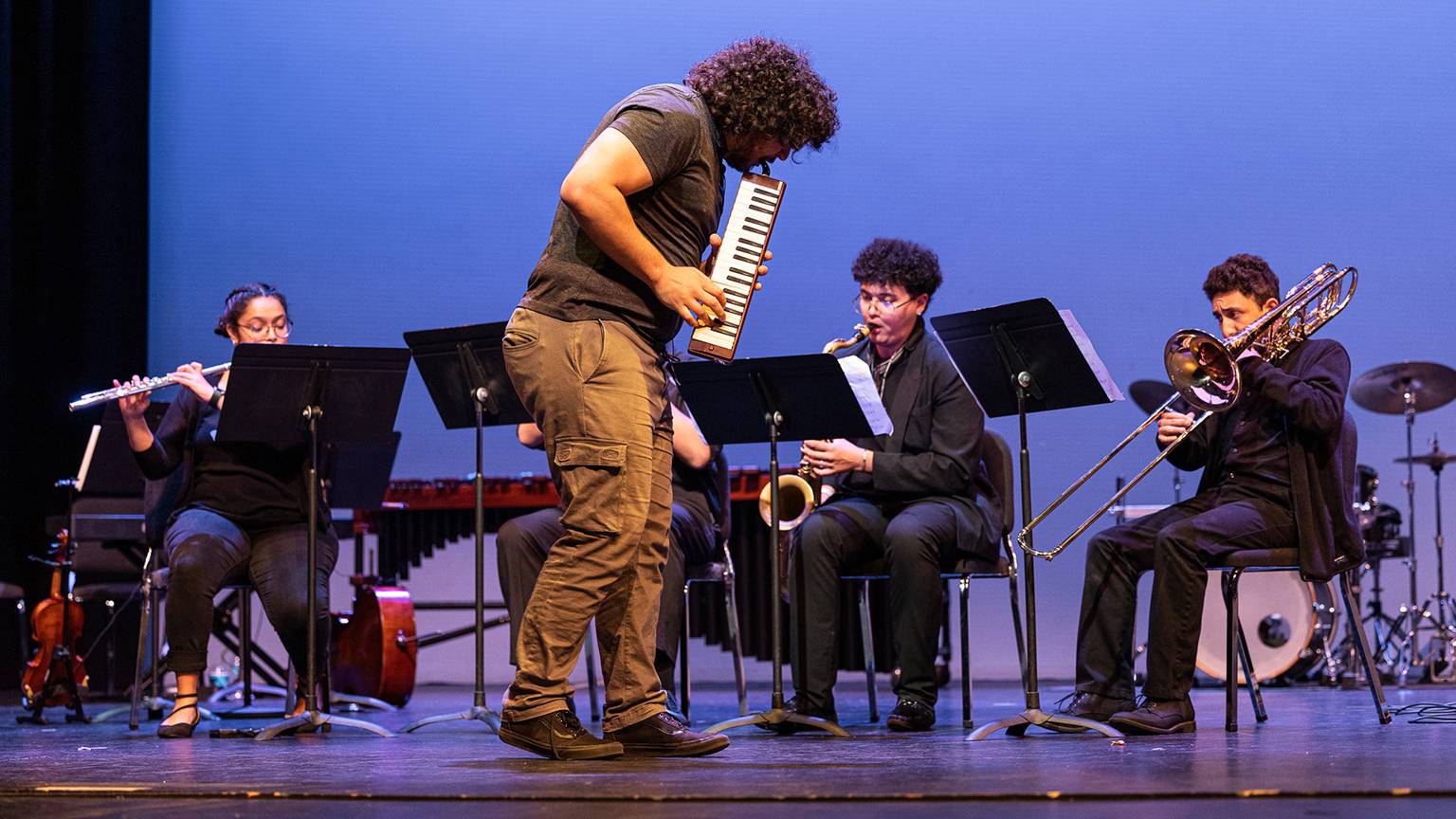
Over the last two years, Texas State University student Jay Nava stayed up through the wee hours of the night, writing and typing notes on his keyboard repeatedly to draft three and a half hours of original hip-hop and classical music.
This was all for a chamber ensemble, electronics, and live bands to perform through the medium of opera.
Nava, who just earned his master’s degree in music with a concentration in composition during 2024’s spring commencement, performed his original “hip-hopera” composition recital, “Realize for Real Here’s,” on April 19 in Evans Auditorium. The recital included about 20% of the full piece.
He decided to pursue a master’s degree at TXST after a professor at Southwestern University in Georgetown, where he received his undergraduate degree from in 2022, told him he should go for it.
“I wanted to stay in Central Texas because of all the connections I made in Austin, and Texas State seemed liked the best spot because of the composition teachers,” Nava said. “I came here with the mindset that I’m going to make the absolute most of every opportunity I have, which is something I didn’t do as much in my undergrad.”
His hip-hopera started as a dream to combine everything he did musically into one piece as a way to bring his different worlds together. He’s had a deep interest in hip-hop and R&B for as long as he can remember, and his passion for classical music grew as he trained as a pianist.
When he thought about the phrase “hip-hopera” during the summer of 2022, Nava hadn’t seen an opera performed on stage in person.
“I knew opera was a sort of monument of the classical era that still exists today as a genre,” he said. “To combine such a thing with hip-hop culture would be right up my alley. With the scale of this piece and the fact that people who are important to me are in the story, I had friends come through and actually play their own selves through different scenes of our lives .”
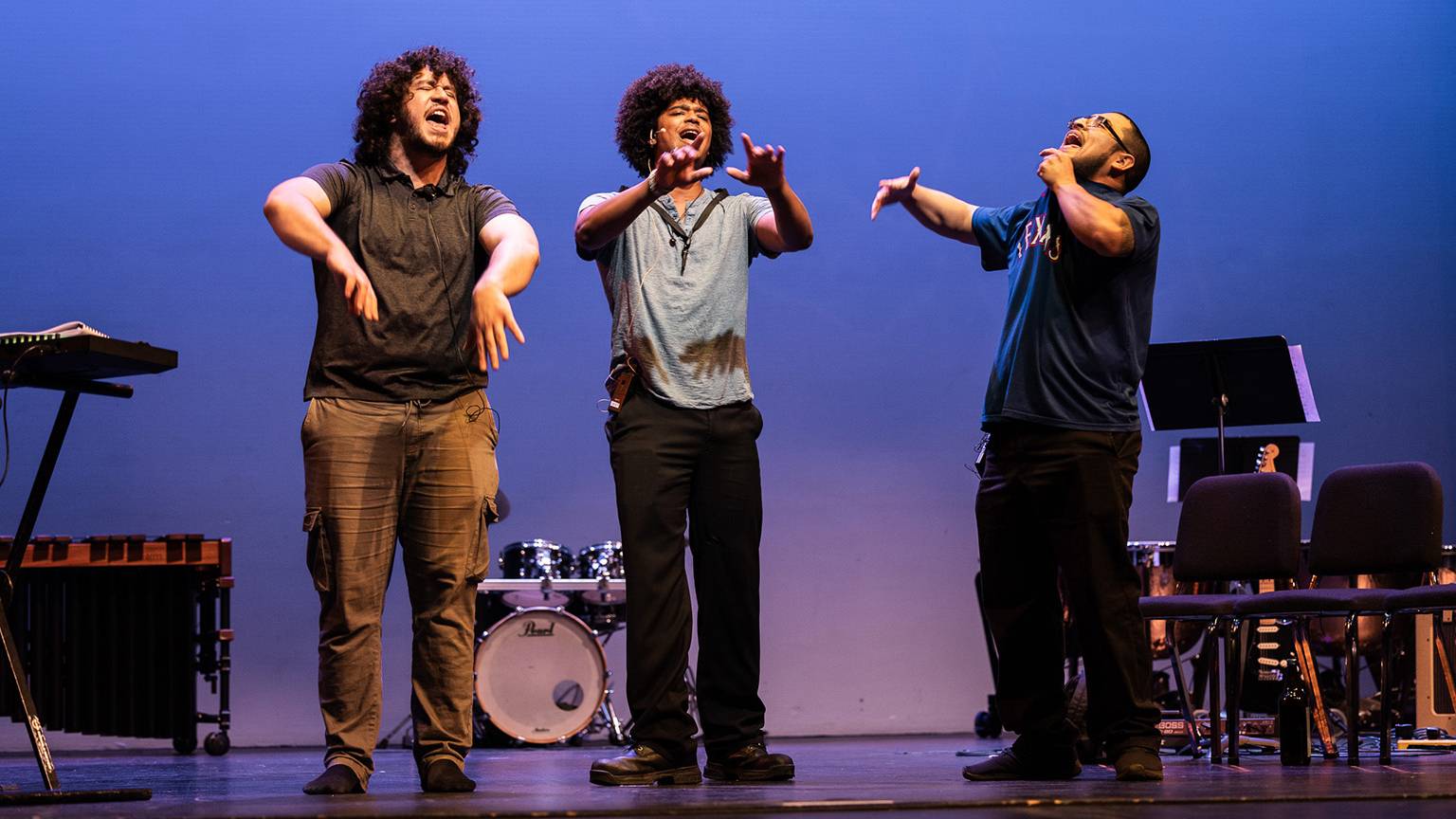
During the recital on April 19, Nava spent the entire time on stage performing vocal duties, conducting, triggering samples as the DJ, and playing various instruments, including the melodica and ROLI Seaboard.
The story structure of the piece features the biggest performances and most transformative times of Nava’s life, including his sports past, eighth grade talent show, the first time performing a show in Austin, and rediscovering himself through music.
“The overarching story is basically me forming my identity around the music I make to help me find out who I am,” he said. “As I’ve gone through life, I’ve formed a stronger sense of identity around that I will find my place in the world doing this music thing. Along the way, I’ve found the value of good friends and confidence in my abilities.”
Now that he’s graduated, Nava will explore opportunities to bring the full production to life in the future so he can focus solely on his vocal duties on stage, which include a mixture of spoken word, rapping, and singing.
He’s also working on albums with his two bands, Royal Regiment and M.PAC, with plans to play shows across the state. As a solo artist, Nava is composing small pieces to perform with friends and build his portfolio.
“I stuck with it and accomplished what I came here to do,” he said. “All the hard work and late nights along the way were worth it in the end.”
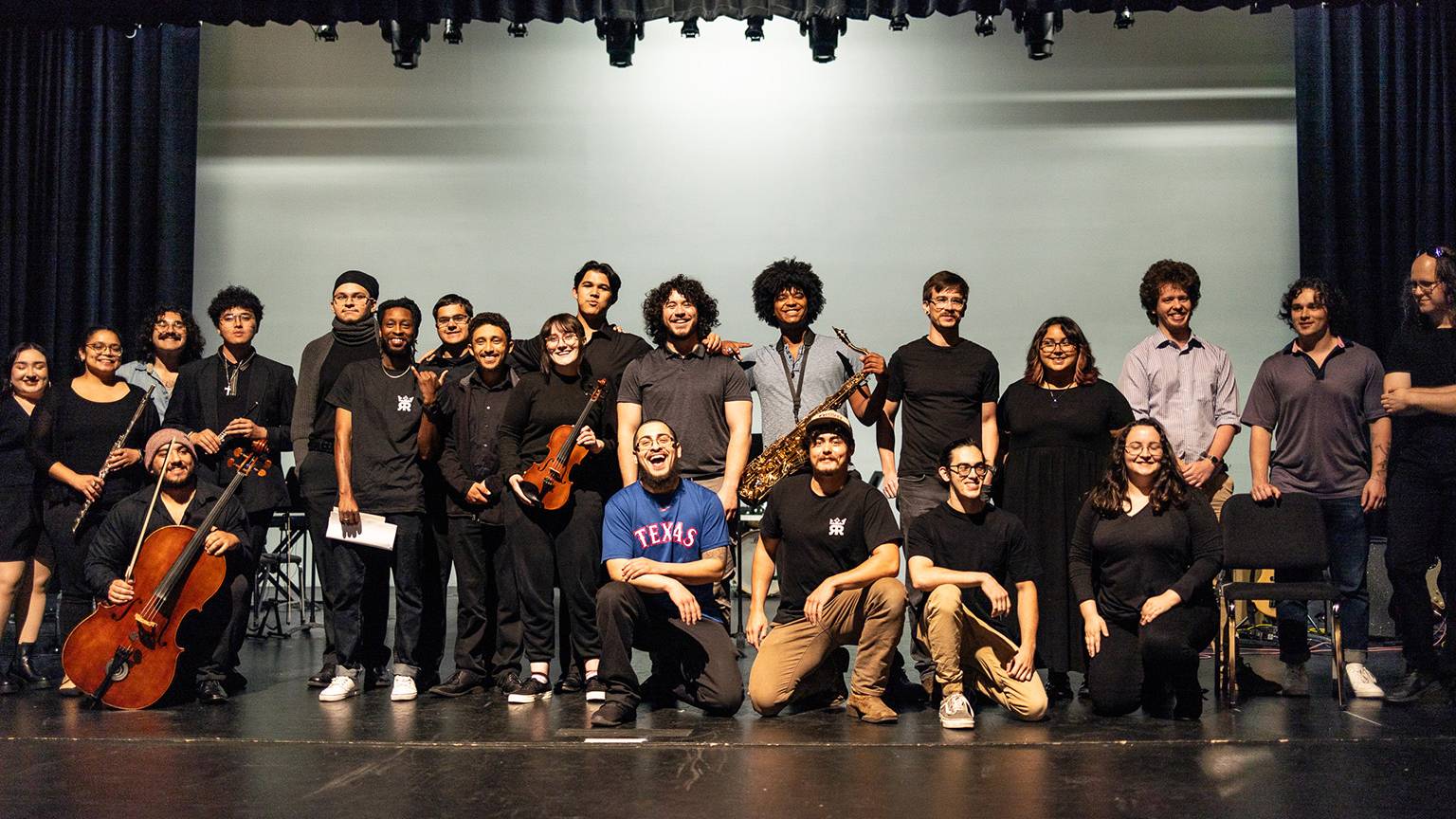
- Click to activate full screen
Share this article
- Share on Facebook
- Share on Twitter
- Submit to Reddit
- Share on LinkedIn
- Share using Email

College of Engineering Graduate Student Success & Engagement Manager
- Madison, Wisconsin
- COLLEGE OF ENGINEERING/ACADEMIC AFFAIRS-GEN
- Academic Services and Student Experience
- Staff-Full Time
- Opening at: May 16 2024 at 15:30 CDT
- Closing at: Jun 6 2024 at 23:55 CDT
Job Summary:
The College of Engineering (CoE) Academic Affairs unit seeks a Graduate Success and Engagement Manager to join the Graduate Affairs team. This position will support a variety of graduate student experience programming. This position has specific responsibility for managing the Graduate Engineering Research Scholars (GERS) program, a fellowship program designed to offer underrepresented graduate students a support network of peers and opportunities. The Graduate Success and Engagement Manager will develop and implement programs for current GERS students to come together throughout their graduate school career for a range of social, academic, professional development and research related activities. Additionally, this position will manage the GERS budget and other administrative tasks that support recruitment, engagement, and retention of students. The Graduate Success and Engagement Manager is also responsible for managing recruitment efforts for the GERS Program, which currently include Summer Undergraduate Research Experiences (SURE) and Opportunities in Engineering Conference. These opportunities invite prospective students to visit our campus and college to explore our graduate programs, network with current students, engage with faculty, conduct research, and participate in social activities. Academic Affairs is a diverse and vibrant unit that includes academic advising, tutoring, career services, student leadership, student engagement, student outreach and recruitment, scholarships, and student wellness. The academic affairs unit has a deep commitment to an inclusion environment and strives to provide outstanding service to the college's students by embracing such values.
Responsibilities:
- 10% Serves as the liaison to internal and external stakeholder groups to identify and maintain academic program-related partnerships
- 5% Identifies, proposes, and implements new or revised unit operational policies and procedures to comply with regulations, institutional policies, and academic program objectives
- 10% Evaluates existing academic program strategy and makes recommendations to unit leadership for program enhancement
- 15% May manage the unit budget and approve unit expenditures
- 20% Assists stakeholders with preparing and/or maintaining documentation, financial management, and/or reporting requirements related to sponsored grants, contracts, or agreements
- 15% Provides full service advising resources and services, provides information about educational options and academic requirements, and communicates directly with students regarding all aspects of the advising process
- 5% Manages degree programs and/or certificates, high impact practice programming and events, and curriculum development and implementation
- 10% Ensures inclusion, diversity and equity is central in all activities and initiatives; engages in practices that build inclusive teams and promotes environments that are welcoming and inclusive
- 10% Provides ongoing holistic support, both in individual appointments and collectively in group settings, to foster the actualization of a student's academic, service, personal, and career goals
- Develop, coordinate, and implement professional development resources and events for graduate scholars
- Develop, coordinate, and facilitate community activities for graduate scholars
- Provide support and advising of program scholars. Meet individually with scholars regarding degree progress and academic progress, assist scholars with problem-solving and crisis intervention
- Maintain accurate records of student progress reports
- Administer fellowship awards, which includes preparing materials, forms, and letters
- Prepare and publish printed and online materials and resources
- Manage website and database and maintain files and archival information
- Assist with data reports related to recruitment, retention, and professional development
- Develop, plan, and coordinate recruiting events. Meet with prospective students and serve as resource contact for prospective students
- Develop and maintain strong working relationship with diversity offices among schools and colleges on campus
- Manages the response, support, and advocacy for graduate students while continuously improving the student experience and overall graduate program
- Oversees programming, services, and events to promote professional development and academic success
- Provides comprehensive services promoting graduate student success, retention, and degree completion
Institutional Statement on Diversity:
Diversity is a source of strength, creativity, and innovation for UW-Madison. We value the contributions of each person and respect the profound ways their identity, culture, background, experience, status, abilities, and opinion enrich the university community. We commit ourselves to the pursuit of excellence in teaching, research, outreach, and diversity as inextricably linked goals. The University of Wisconsin-Madison fulfills its public mission by creating a welcoming and inclusive community for people from every background - people who as students, faculty, and staff serve Wisconsin and the world. For more information on diversity and inclusion on campus, please visit: Diversity and Inclusion
Required Bachelor's Degree
Graduate Degree preferred
Qualifications:
Required Qualifications - 3 years required, 5 years preferred, of professional or graduate experience working with students of multicultural backgrounds (e.g., working with students from multicultural backgrounds in the area of: academic affairs, advising, or teaching, etc.). - Familiarity with graduate academic programs. Examples include: experience in an academic or STEM-related role; graduate student advising; graduate student support; previous graduate school experience or supporting multicultural programming. - Demonstrated experience efficiently managing multiple tasks with multiple deadlines (organizing, prioritizing, identifying and solving problems; consistently meeting deadlines; attention to detail; accuracy, etc.) - Demonstrated experience supporting a welcoming environment for students of all backgrounds (e.g., engagement, safety, connectedness, support, etc.) - Experience helping students achieve personal and academic success (e.g., connecting students with resources; academic advising and mentoring, etc.) - Experience collaborating with a variety of stakeholders that include, students, staff, faculty, division and cross campus partners - Experience taking initiative and independently managing multiple activities and day-to-day operations, including setting expectations and goals - Experience managing medium size (50-200) events and programs Preferred Qualifications: - Experience with word processing, email, spreadsheets, and database software to organize information, create mail merges, manage data, and perform basic analyses (Microsoft Office Suite, Google, etc.) - Experience providing administrative and/or programmatic support to someone in a leadership role or to a team (e.g., coordinates schedules; prepares and submits reports; manages information electronically; assists with event planning/activities; liaison to internal and external partners; budget coordination) - Experience monitoring and evaluating program success - Experience engaging and recruiting prospective graduate students and analyzing recruitment efforts
Full Time: 100% It is anticipated this position requires work be performed in-person, onsite, at a designated campus work location.
Appointment Type, Duration:
Ongoing/Renewable
Minimum $60,000 ANNUAL (12 months) Depending on Qualifications This position offers a comprehensive benefits package, including generous paid time off, competitively priced health/dental/vision/life insurance, tax advantaged savings accounts, and participation in the nationally recognized Wisconsin Retirement System (WRS) pension fund. For a summary of benefits, please see https://www.wisconsin.edu/ohrwd/benefits/download/fasl.pdf .
Additional Information:
Eligible for remote work - eligible for one day remote after completion of a training period. Position will require occasional evening and weekend hours during the academic year. Please note that successful applicants are responsible for ensuring their eligibility to work in the United States (i.e. a citizen or national of the United States, a lawful permanent resident, a foreign national authorized to work in the United States without need of employer sponsorship) on or before the effective date of appointment.
How to Apply:
Please click on the "Apply Now" button to start the application process. Applicants will be asked to upload a resume and cover letter. Please outline relevant experiences and qualifications as it pertains to the required and preferred qualifications noted in this job description. Don't feel you meet every qualification? At the College of Engineering, we are dedicated to building a diverse, inclusive, and authentic workplace. If you're excited about this role, but your past experience doesn't align perfectly with every qualification, we still encourage you to apply.
Beth Brandl [email protected] 608-262-5270 Relay Access (WTRS): 7-1-1. See RELAY_SERVICE for further information.
Official Title:
Academic Program Manager(AE024)
Department(s):
A19-COLLEGE OF ENGINEERING/ACAD AFFRS/GRAD STU SERV
Employment Class:
Academic Staff-Renewable
Job Number:
The university of wisconsin-madison is an equal opportunity and affirmative action employer..
You will be redirected to the application to launch your career momentarily. Thank you!
Frequently Asked Questions
Applicant Tutorial
Disability Accommodations
Pay Transparency Policy Statement
Refer a Friend
You've sent this job to a friend!
Website feedback, questions or accessibility issues: [email protected] .
Learn more about accessibility at UW–Madison .
© 2016–2024 Board of Regents of the University of Wisconsin System • Privacy Statement

We use cookies on this site. By continuing to browse without changing your browser settings to block or delete cookies, you agree to the UW–Madison Privacy Notice .
- A-Z Directory
- Campus Maps
- Faculties and Schools
- International
- People and Departments
- Become A Student
- Give to Memorial
- Faculty & Staff
- Online Learning
- Self Service
- Other MUN Login Services
Faculty of Engineering and Applied Science
- Graduate Internship Program 2025
Engineering Co-operative Education Office (ECEO) and Engineering Graduate Office (EGO) offer the Graduate Internship Program (GIP) to provide graduate students in the participating professional programs an opportunity to gain valuable work experience through an full-time, paid internship of eight months with a single employer. Admission to it is limited, competitive, selective and not mandatory. All details pertaining to the GIP for any future cohort(s) are subject to annual review, and ECEO and EGO maintain the rights of any changes to it in accordance with regulations.
This Q&A is for the 2025 Graduate Internship Program (GIP).
1) Is this a co-op program?
- Not to be confused with the mandatory co-op education program undertaken by undergraduate Engineering students at Memorial, this Graduate Internship Program (GIP) is optional and offers limited, competitive, and selective admissions to eligible graduate students who are nominated to it.
2) Which academic programs are participating in the GIP and who are eligible for it?
- Oil and Gas Engineering;
- Environmental Systems Engineering and Management;
- Safety and Risk Engineering Management;
- Energy Systems Engineering; and
- Computer Engineering
- Completion of at least five program courses for students who started their program in Fall 2023; or
- Completion of at least three program courses if they started their program in Winter 2024.
- Twenty-five eligible students (five from each participating program) will be nominated and invited for opt-in to the 2025 cohort. They will have to submit the opt-in request form to proceed.
3) When does the 2025 Graduate Internship Program (GIP) start and how long is it for?
- It will begin in Spring 2024 semester to prepare students who have opted in for an eight-month full time internship that lasts through Winter 2025 and Spring 2025.
4) Can you increase the number of students invited to opt-in to more than twenty-five?
- The GIP is subject to yearly review before we introduce it more widely.
5) I am a thesis-based (MEng/PhD) Engineering student. Can I participate?
- No. You are in a research-intensive program; you should focus on conducting and completing research funded by your supervisor(s).
6) I am currently studying in a professional engineering program. Why is it not listed as one of the participating programs above?
- The GIP is not a faculty-wide program. Each academic program makes its own decision to offer what they deem the best program experience to its students. Only the five academic programs listed above are currently participating in GIP.
7) I am a graduate student in one of the participating programs. Do I have to apply to be considered for the GIP? How can I express interest in it?
- You do not have to apply or express interest. The EGO will invite top five eligible students from each participating programs for opt-in to the 2025 cohort of GIP.
8) What is the criteria used for a student to be nominated and invited for an opt-in to the GIP?
- The primary criteria is academic performance. Five eligible students with the highest cumulative average by the end of Winter 2024 semester will be invited by the EGO to opt-in to the GIP. If there are two students with the same cumulative average, the student who completed more program courses will be selected between them. The decision of the nominations is final.
9) When can I expect to find out if I am invited to opt-in?
- You will be notified by the EGO via email by the first two weeks of classes in Spring 2024 semester at the latest. You do not have to send follow-up emails.
10) I am invited to opt-in. What can I expect if I submit the opt-in request form?
11) Am I guaranteed an internship if I am opting into the GIP?
- You have to first pass the pre-screening set by the ECEO then secure an internship placement through the job competition hosted by the ECEO (with help and guidance from EGO and ECEO). Internship placement is not guaranteed as a significant part of the employer selection process depends on relevant experience and the quality of the application (including resume, cover letter and an interview).
12) What if I am opting into the GIP but I do not pass the pre-screening or secure an internship placement?
- You will continue with taking and completing your program courses related to your degree as normal.
13) Will there be an additional fee to participate in the GIP?
- Yes, students are expected to pay for the additional fee associated with participating in the GIP.
14) How much would a student be paid for an internship?
- Students in the undergraduate engineering program normally earn approximately $2,000 to $4,000 per month. For more details, please refer to the university student employment salary page: https://www.mun.ca/hr/careers/student-and-other-positions/student-employment-rates/
15) Will I receive credit hours for the internship?
16) I am invited to opt in but I have other questions to ask but these questions are not covered in this Q&A.
- EGO and ECEO will meet with you and provide guidelines to help prepare you for the Graduate Internship Program (GIP).
17) I have some questions and/or feedback. Who can I contact?
- Please email [email protected] .
- Prospective Students
- Funding and Scholarships
- Student News
- New Graduate Students
- Current Student Resources
- Engineering Graduate Student Societies
- Instructor TA Requests
- Opportunities
Related Content

Mount Berry, Georgia
Kennesaw, Georgia
Presque Isle, Maine
Hiram, Ohio
Canton, New York
30410, Georgia
Seward, NE, USA
Charlotte, North Carolina
Medford, Massachusetts
Murfreesboro, Tennessee
Wilmington, Ohio
Manhattan, Kansas
Hanover, New Hampshire
Abilene, Texas
Snyder (SCURRY), Texas
Bolivar, Missouri
Riverside, California
Huntsville, Alabama
Arkadelphia, Arkansas
Phoenix, Arizona
Greenville, Pennsylvania
Baltimore, Maryland
Farmington, Maine
Lewiston, Maine
Captcha / Bot check:
Posted: 08-May-24
Location: Mount Berry, Georgia
Type: Full-time
Categories:
Bachelor's degree required, Master's degree preferred. Previous coaching and teaching experience at the NCAA Division III collegiate level is preferred. Lifeguard certification is required at the time of hire or within three months. Proficient with Hy-Tech and Colorado Timing Systems preferred. The candidate should also possess good communication skills and strong leadership and mentoring abilities, supporting the vision and goals of the program. This position includes competitive benefits and a salary commensurate with qualifications and experience.

This page uses technologies your browser does not support.
Many of our new website's features will not function and basic layout will appear broken.
Visit browsehappy.com to learn how to upgrade your browser.

- university of new orleans
- campus news
- graduate student wins coastal protection research grant
CAMPUS NEWS: MAY 16, 2024
Coastal research, graduate student wins coastal protection research grant.
Share this article
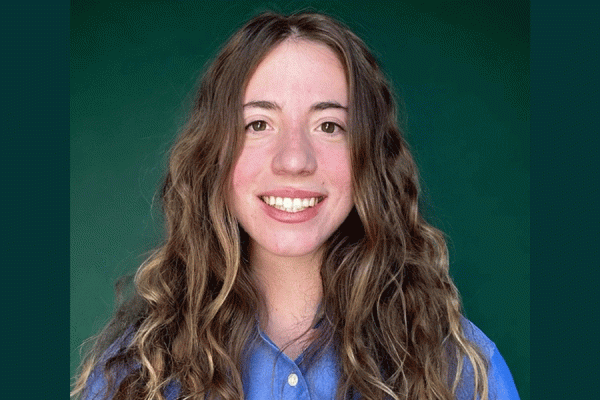
University of New Orleans student Lydia DiPaola, who is pursuing a master’s degree in biological sciences, is a recipient of a research fellowship.
University of New Orleans graduate student Lydia DiPaola is the recipient of a one-year $10,000 fellowship, which will fund her research to address high priority needs within Louisiana’s coastal environment. She is the first to earn a Graduate Interjurisdictional Research Fellowship, a joint effort of Louisiana Sea Grant and Louisiana Space Grant, along with the North Carolina Sea and Space Grant Programs.
DiPaola is a master’s degree student in biological sciences at UNO. The Tucson, Arizona native earned a bachelor’s degree in biological sciences from Arizona State University. Her project is titled “Monitoring Biotic and Abiotic Responses to a Shoreline Protection Barrier Project in Jean Lafitte National Park.” Nicola Anthony, professor of biological sciences, is DiPaola’s faculty adviser.
To restore 50 acres of submerged aquatic vegetation lost since the Deepwater Horizon Oil Spill in 2010, the Jean Lafitte National Park and Historic Preserve is building a 2.2-mile-long shoreline protection barrier along Lake Salvador. Completion is expected this summer. Submerged aquatic vegetation beds are important wetland features that provide food and shelter for local aquatic species, stabilize sediments, filter water of contaminants and directly reduce erosion and wave action.
The barrier’s construction is expected to have short-term adverse impacts on water quality and submerged aquatic vegetation in the area, but benefit wetland communities in the long-term. DiPaola will monitor vegetation diversity and coverage, fish community assemblages, water quality and shoreline erosion and/or accretion for one year following the barrier’s construction. Her immediate post-construction monitoring will help managers respond effectively to interim environmental impacts in order to address longer-term environmental injuries caused by the Deepwater Horizon disaster.
The work is being carried out in collaboration with Erin Cox, assistant professor of biological sciences; Martin O’Connell, professor of earth and environmental sciences; and Julie Whitbeck with the Jean Lafitte National Historical Park and Preserve.
The transregional aspect of the program is to promote a greater understanding of the issues researched and create professional development opportunities for the funded graduate students. Fellowship recipients use data from a variety of archives and the remote sensing capabilities available through the National Oceanic and Atmospheric Administration (NOAA) and the National Aeronautics and Space Administration (NASA) to address high priority needs within Louisiana’s nearshore environment.
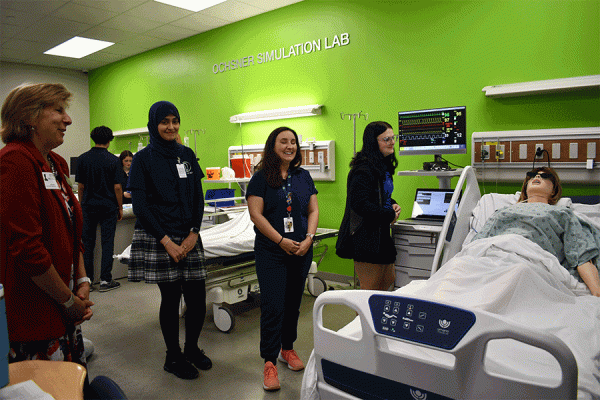
School Of Education Partners With Kenner Discovery Schools To Create ‘Teacher Pipeline’
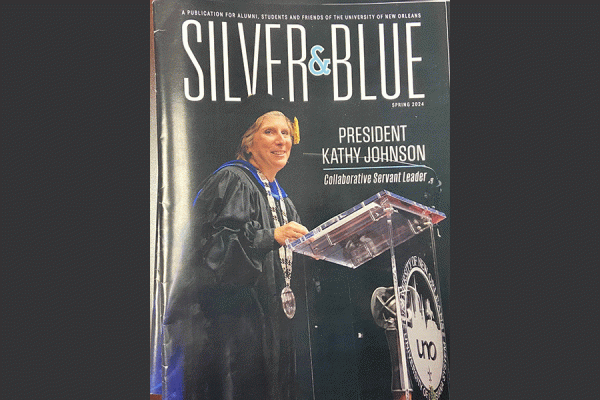
President Kathy Johnson Graces the Cover of the Spring 2024 Issue of Silver & Blue
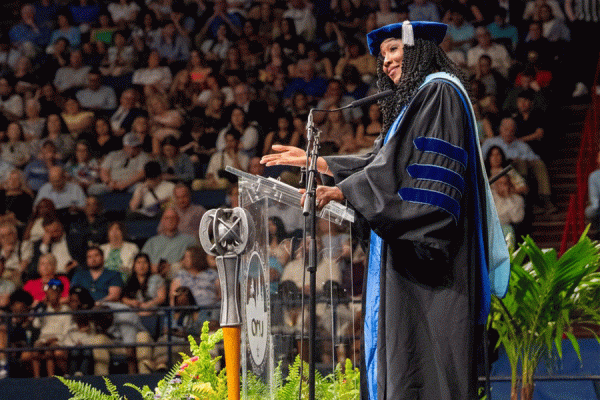
College Sports Executive Kiki Baker Barnes Tells UNO Graduates Be ‘ready to embrace the unexpected’

IMAGES
VIDEO
COMMENTS
The results of Nature's fifth survey of PhD students bear out Kovačević's experience, telling a story of personal reward and resilience against a backdrop of stress, uncertainty and ...
In this article we - a group of PhD students, postdocs and permanent academics - highlight the positive elements of doing a PhD in order to present a more balanced view of the whole PhD experience. We also make recommendations to maintain a positive momentum throughout the PhD. Although these ideas and recommendations are based on our ...
One of the most powerful aspects of the Princeton experience is the diversity of perspectives and interests within our graduate student community—it's evident in our numerous events, programs, and student organizations. Join our fun programs and traditions, or create your own! There's something for everyone here at Princeton. Residential ...
20. Enjoy your PhD! It can be tough, and there will be days when you wish you had a 'normal' job, but PhDs are full of wonderful experiences and give you the opportunity to work on something ...
Many institutions now require their students to participate in a Doctoral Development Plan (DDP). This is to assess your growth in key fields such as research, presentation and publishing as well as other important skills like networking, teaching and time management. By the end of the PhD you will be expected to demonstrate how you have gained ...
The PhD program's distinct academic approach is designed to enable students to excel as researchers, educators, and scholars in the future. Throughout their five-year experience, students focus on one of seven distinct areas of study.Students work closely with PhD faculty and the other students within their field of study, among other scholars and peers across the university.
The Daily Life of a PhD Student. The daily life of a PhD student can be quite a departure from what you've experienced as an undergraduate or Masters student. You'll have much more independence and little to no 'taught' elements. Your average week will likely involve a similar amount of PhD study hours to a full-time job.
"The graduate student experience is unique and multifaceted for each student. At the MechE Graduate Office, our team approaches each student holistically trying to pave the way so that there are less bumps along the way," says Saana McDaniel, academic administrator for the mechanical engineering graduate program.
The PhD student experience is a complex and multifaceted journey that offers a unique blend of challenges and triumphs. As we have explored in this blog, the road to obtaining a PhD is filled with personal growth, professional development, and numerous hurdles to overcome.
Don't see your PhD as just a road map laid out by your supervisor. Develop good writing skills: they will make your scientific career immeasurably easier. To be successful you must be at least ...
I condensed twenty, 20-min interviews into a 10-min video that explains what a PhD is really like to do! I asked about workloads, social life, best parts vs ...
Experience a Culture of Collaboration. When you join the Michigan Ross doctoral program, you become part of a collaborative cohort of peers eager to exchange ideas, learn from each other's experiences, and build lifelong relationships. You'll work under the mentorship of renowned faculty who share your passion for knowledge and will ...
My PhD is beyond doubt one of the hardest, most rewarding, confidence- sapping, confidence- boosting, brutal and uplifting academic challenges I have ever faced. The progression from the neatly defined, taught modules of an undergraduate or masters degree to the student-led study required for a PhD is vast. Vast, but absolutely achievable.
There are many ways to gain professional experience as a graduate student, including campus fellowships, internships and leadership positions with one of the many student organizations. Professional experiences can serve a variety purposes, including exploring new industries, learning to apply transferable skills in new areas, learning entirely ...
The PhD Student Experience. Our graduate students are working to change the world one research project at a time. They come to us from all over the world to engage in research that deepens knowledge and practice in education. Here are a few of our graduate students, discussing their experiences in the Education Doctoral Program, their research ...
PhD Student Life. The full doctoral student experience at Harvard is not just about outstanding academics. It's also about the community you build, the connections you make, and the many ways for you to grow academically, professionally, and personally. There are many student organizations and opportunities for you to make your doctoral ...
SHARE: Most graduate schools will expect applicants to have practical experience in a lab. A strong application portfolio will most likely include participation in research throughout the undergraduate years, both during the academic year and the summers. It's important that you pursue research opportunities during the academic year and summers ...
For example, the Global PhD Server enables doctoral students to discuss their experience, exchange anecdotes, and offer or seek help. The @PhDForum supports a variety of activities, such as writing sessions for PhD students working on papers or chapters of their thesis, while Stack Overflow is a good place to offer/seek help with coding and ...
As a PhD student you're able to go that crucial step further and produce the significant original contribution to knowledge that defines a doctorate. ... Publishing during a PhD will help you increase your academic profile, as well as give you experience of the peer review process. It's not normally a requisite of your PhD, but publications ...
What you teach will drive you. Who you teach will inspire you. "I thoroughly enjoyed my teaching experience in the PhD program. I loved having the opportunity to take my passion for business strategy and translate it into classroom discussions with our undergraduate students. I was impressed by the caliber of the students here at Carolina ...
March 25-27, 2024. Asheville, NC. Discover the untapped potential of graduate education at The Graduate Student Experience™ conference. While much attention has been focused on undergraduate education, it's time to give graduate students the same level of consideration. Join us as we discuss holistic approaches to student success, covering ...
About the Lundquist College. One of 185 programs—just 1.5 percent of the world's business schools—fully accredited by the Association to Advance Collegiate Schools of Business (AACSB) in both business and accounting. PhD program: 30-40 students. MBA program: about 130 students. MAcc program: about 30 students.
Exploring Careers as a PhD. Published on May 13, 2024. Are you thinking of pursuing a PhD, or are you currently in the middle of a program? Ever wonder what life can look like on the other side of defending your dissertation? Well, the path is not all too linear, and your first job may not be your last job; however, it may be a door to a world ...
Under Education I list my time as a graduate student, and under Experience (as "Appointments"), I list my time as a Graduate Research Assistant. I've seen this on lots of CVs in the US. Both are true, and both convey the right meaning. I disagree with putting into both places - takes away space and confuses the reader.
Over the last two years, Texas State University student Jay Nava stayed up through the wee hours of the night, writing and typing notes on his keyboard repeatedly to draft three and a half hours of original hip-hop and classical music. This was all for a chamber ensemble, electronics, and live bands to perform through the medium of opera.
Throughout this early childhood special education degree, you'll master the skills necessary to support and educate young children, including those with exceptionalities. You'll also gain a deep understanding of child development theories and best practices, learn about both typical and atypical child development and the use of research ...
Job Summary: The College of Engineering (CoE) Academic Affairs unit seeks a Graduate Success and Engagement Manager to join the Graduate Affairs team. This position will support a variety of graduate student experience programming. This position has specific responsibility for managing the Graduate Engineering Research Scholars (GERS) program, a fellowship program designed to offer ...
Engineering Co-operative Education Office (ECEO) and Engineering Graduate Office (EGO) offer the Graduate Internship Program (GIP) to provide graduate students in the participating professional programs an opportunity to gain valuable work experience through an full-time, paid internship of eight months with a single employer. Admission to it is limited, competitive, selective and not mandatory.
Previous coaching and teaching experience at the NCAA Division III collegiate level is preferred. Lifeguard certification is required at the time of hire or within three months. ... Berry College has an enrollment of about 2,200 undergraduate and graduate students. The college is located in Rome, Georgia, 75 miles northwest of Atlanta and 75 ...
University of New Orleans graduate student Lydia DiPaola is the recipient of a one-year $10,000 fellowship, which will fund her research to address high priority needs within Louisiana's coastal environment. She is the first to earn a Graduate Interjurisdictional Research Fellowship, a joint effort of Louisiana Sea Grant and Louisiana Space Grant, along with the North Carolina Sea and Space ...